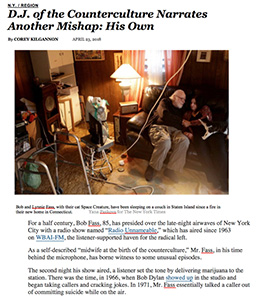The New York Radio Archive's Archive
60 Years Ago: February 7, 1964 begins Beatlemania in the U.S.
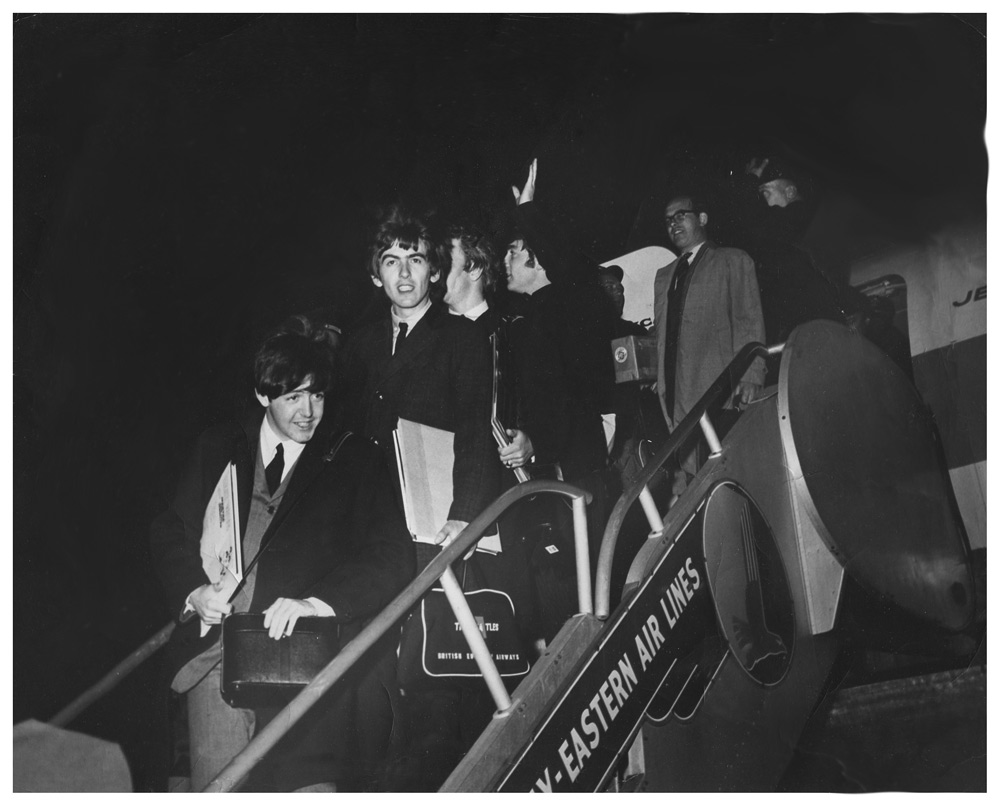
This photo was taken by my father 60 years ago this month. This is not when the Beatles first landed from England, but rather when they returned to NYC from their Washington, D.C. concert a few days later. As a teen, I was upset with him for not getting all four Beatles facing the camera, but he claimed that his life was in serious peril from the teen girls who were waiting at the airport for the Beatles. However, facing the camera or not, this photograph had high value in terms of my relationship with the young girls in my junior high school class who didn't pay too much attention to me before I proudly showed up with this print. Unfortunately, the original negative has been lost. This image has been restored from a time-worn print. (Click for a larger version.)
While most casual observers think the Beatles first appeared on U.S. television on the Ed Sullivan show on February 9, 1964, they actually appeared on the Jack Paar show a month earlier on January 3, 1964 via a film made on November 16, 1963. This so enraged Sullivan that he almost cancelled their appearance on his show. They also appeared on a news report on NBC's Huntley-Brinkley Report on either November 16th or 18th 1963. CBS also did a news item on November 21st. There were other reports scheduled for November 22nd, but they were never broadcast due to the Kennedy assassination.
In any case, the world would never be the same and even with the demise of oldies radio, it's remarkable how often Beatle songs are still played today, more than a half century later. We certainly weren't listening to songs from 1904 in 1964. (2/7/22, revised 2/6/24)
Rocktober
Two big radio anniversaries this month: DJ's joined WOR-FM 57 years ago October 8th and WNEW-FM launched their rock format October 30th, 56 years ago. (WNEW-FM always claimed in marketing that it was Halloween, but it was actually the night before).
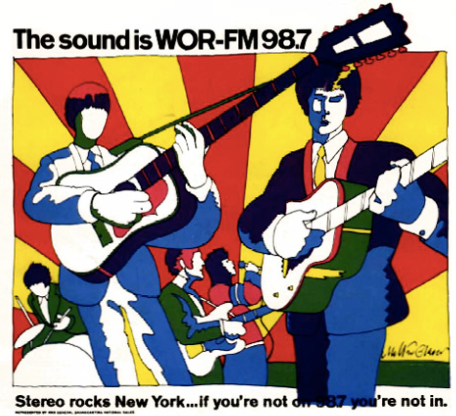
Designed by Milton Glaser
WOR-FM started playing rock on July 30, 1966, but without DJs. The DJs joined on Saturday, October 8, 1966. You can hear some airchecks of that first day by going to the WOR-FM page. When they finally did make it to air, we heard a simulcast of John Gambling until 9am, Scott Muni holding down two shifts from 9am until noon and from 3-6pm; Johnny Michaels from noon to 3pm, Murray the K from 6pm to midnight and Rosko initially from just midnight to 2am. Shortly afterwards, Johnny Michaels would move to mid-mornings, Muni from 1-6pm, Murray the K (Murray Kaufman) to 11pm and Rosko (Bill Mercer) until 2am followed by a Barry Farber simulcast from the AM side.
After WOR-FM gave programming responsiblities to Bill Drake the following summer, all of the original jocks left the station. Rosko resigned from WOR-FM on Monday night, October 2nd, 1967. On Saturday, October 7th, 1967, he appeared on Pete Fornatale's "Campus Caravan" show on WFUV to explain why he resigned. A very rare aircheck of that interview is posted here.

Execs at WNEW-FM listened to that show and decided to pick up Rosko. Alison Steele was already a member of the airstaff, having been part of the "all-girls" middle-of-the-road format. Rosko's first show was on October 30, 1967. Management actually tested the rock waters relatively slowly: Jonathan Schwartz wouldn't join until November 16th and Scott Muni didn't join until December 18th. The rest is radio and rock history. More on the WNEW-FM page.
And October 5th is another great anniversary: On this day in 1962, 61 years ago, the Beatles released their first single in the UK, "Love Me Do" having recorded it on September 4th and September 11th.
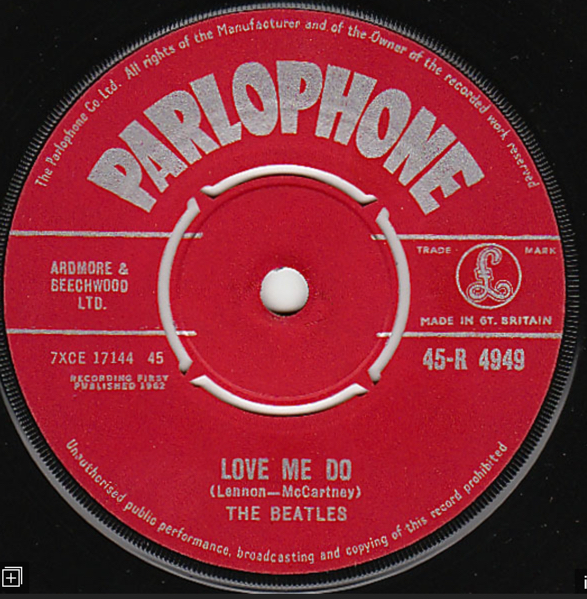
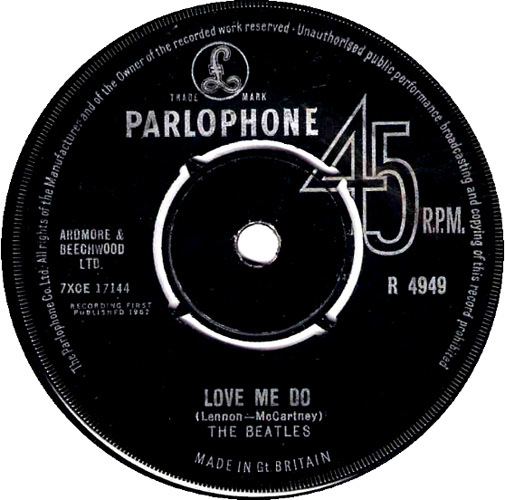
Red label = Ringo - Black label = Andy White
As has been documented many times, Ringo had just joined the Beatles, but upon showing up at EMI Studios, producer George Martin decided to use a session drummer, Andy White. Ringo thought he would wind up fired like Pete Best. As a result, there have been at least three different versions of "Love Me Do" released.
The very first single release featured Ringo, but after the first run, the pressing was switched to the Andy White version (black label) where Ringo is relegated to tambourine. I remember hearing one version on the radio and then the version everyone was playing changed. The "Past Masters" album features the Ringo version. The "Please Please Me" LP featured the Andy White version. "The Beatles Anthology volume 1" includes a Pete Best version recorded on June 6, 1962. "Beatles #1s" includes the Andy White version. (updated 10/2/23)
Steve Clark dies
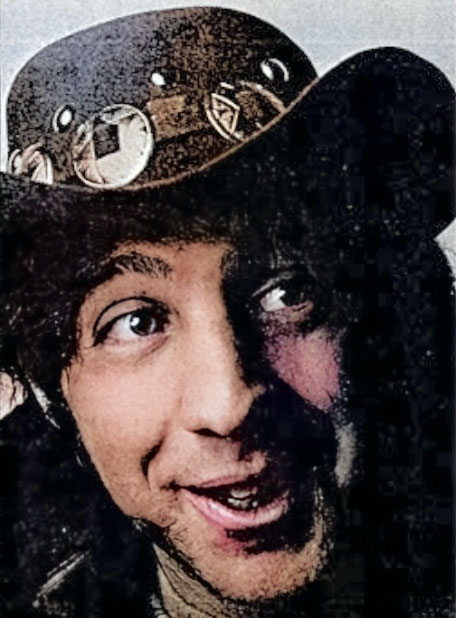
We're losing all the greats: Steve Clark, who was a DJ on WMCA for a short time in 1967, WOR-FM during the Bill Drake years and WCBS-FM during it's hybrid singles/AOR format in 1969 and 1970 has passed away.
(posted 6/30/23)
Bob Shannon dies at 74

We're sorry to have to communicate the sad news that WCBS-FM DJ Bob Shannon (Don Bombard) has died, according to published reports.
In addition to his work on WCBS-FM, Bombard was an author of the book Behind The Hits: Inside Stories of Classic Pop and Rock and Roll.
Don started his radio career with a home-made (and illegal) transmiter at his home when he was 15 years old. He joined the Syracuse University radio station in 1965 and from 1967 to 1977 worked at WNDR and WOLF. In 1977 he moved to Pittsburg and worked at WKTQ. In 1981, he moved to NYC and worked at a recording studio and he became a fill-in announcer at WYNY. He would soon join WCBS-FM where program director Joe McCoy changed his on-air name to Bobby Shannon, which evolved to Bob Shannon. In 1982, he was promoted to a full time shift at the station and in 1986, he took over Dick Heatherton's afternoon slot.
Bombard left WCBS-FM when it switched to the Jack FM format, but rejoined the station in July of 2007 when it became a Classic Hits station. He left again in 2012 due to health reasons.
Bombard, in his Bob Shannon persona, was a superb air personality who could "do" format radio, but also bring a lot of personality and special features, such as "Hands Across the Water", "Rockeology", ""First and Foremost", "Different Songs with the Same Title", "lost hits", ""Three For The Road", "Four plays", etc.
While he hasn't been on the air for some time, he'll be missed.
(posted 6/28/23)
75th Anniversary of the LP
On June 21, 1948 (some reports claim June 18th), Columbia Records announced the first 33 1/3 RPM, 12-inch, microgroove LP record at the Waldorf-Astoria hotel in New York City. Columbia's president Goddard Lieberson did the honors.
Under the leadership of Peter Goldmark, Columbia developed a successful engineering approach to the LP. It had been tried before, but a combination of economic and technical factors had previously caused it to fail. The success of the LP was never guaranteed because every phonograph in existence had to be replaced. And if anyone made the mistake of being an "early adopter", they would be sorry within the next few years when RCA introduced the 45RPM single.
Columbia even copyrighted the term "LP", but that fell by the wayside when they realized that to be successful, they had to license the technology to other record labels, even arch-enemy RCA.
Columbia's first LP, ML4001, which was released a week later on June 28th, was the Philharmonic Symphony Orchestra of New York with soloist Nathan Milstein and conductor Bruno Walter performing the Mendelssohn Violin Concerto in E Minor. The original list price for that record was $4.85, which is $61.20 in current dollars (as of June 2023). (And consumers complained about CD prices!) Columbia also released a 10" LP on the same day for $3.85 ($48.58 in current dollars). At those prices, it's amazing the LP was successful.
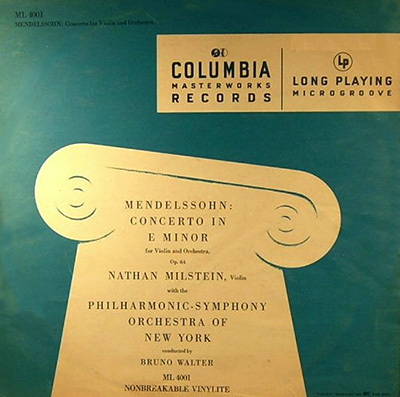
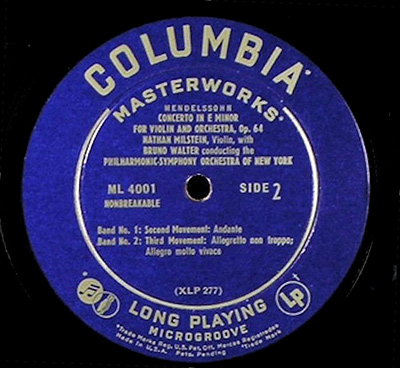
The very 1st LP released.
According to a history of the LP published in High Fidelity magazine in 1958, Goldmark assigned different researchers to different aspects of the development: amplifier, stylus and cartridge design, turntable design, motor, etc. As a reward for his work on the LP, CBS built the CBS Technology Center, which resided for many years in Stamford, Connecticut.
To this day, we still call LP's, "albums", but that's actually a holdover from 78RPM albums of multiple discs, which were necessary to carry complete operas, orchestral works or Broadway shows.
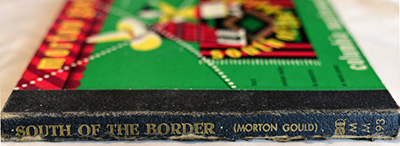
An example of a 78RPM Record "Album".

One of the earliest illustrated LP jackets as designed by Alex Steinweiss, who "invented" the illustrated album cover.
(Posted 6/2018, revised 9/27/2019, 6/16/2020, 3/22/21, 6/28/21, 7/10/22, 6/19/23)
Radio Hall of Fame 2023 Nominees
The Museum of Broadcast Communications announced today the selection of Radio Hall of Fame 2023 nominees. The 24 nominees were chosen by the Radio Hall of Fame Nominating Committee, with input from the radio industry and listeners.
Voting for inductees begins Friday, June 16, 2023 and runs through June 30th, at 11:59pm PT. The top six vote recipients will gain induction as part of the 2023 Radio Hall of Fame Induction class. The two additional inductees that will make up the eight-person induction class will be selected by the Radio Hall of Fame Nominating Committee.
More than 800 industry members will receive a confidential online ballot on Friday, June 16th to cast votes for up to six nominated individuals. The confidential balloting process will be conducted by Votem.com, and overseen by Miller Kaplan's Andrew Rosen.
2023 Radio Hall of Fame inductees will be announced Monday, July 24th and honored in-person at the 2023 Radio Hall of Fame induction ceremony on Thursday, November 2nd at the InterContinental New York Barclay Hotel in New York City.
Nominees: Bert Weiss, Bob Rivers, Charles Laquidara, Dyana Williams, Gerry House, Jaime Jarrin, John & Ken, John DeBella, Johnny Magic, Kevin Matthews, Kid Leo (Lawrence Travagliante), Larry Elder, Laurie DeYoung, Lee Harris, Rev. Louise Williams Bishop, Mark Simone, Mary McCoy, Matt Siegel, Mojo in the Morning, Monica May, Nina Totenberg, Pat St. John, Shadoe Stevens and Shelley "The Playboy" Stewart.
From our (biased) perspective, we hope Pat St. John, Nita Totenberg and Charles Laquidara win.
(Posted 6/16/2023)
The State of the Recorded Music Business

The RIAA released the final 2022 North American recording industry sales numbers and while the overall business grew, as has been the trend, physical media continued its decline (except for vinyl LP's) as expected.
As compared to 2021, CD units at 33.4 million units were down 29% and vinyl LP's increased 3% in units and 17% in revenue, shipping 41.3 million units. But physical media is still just a very tiny portion of the overall business (11.2%). LP revenue (at list prices) is now almost 3x CD revenue ($1.224.4 billion vs. $482.6 million).
Downloads continue their slow decline in favor of streaming. Only 23.9 million albums (down 23%) and 177 million singles (down 19%) were downloaded. We have a generation that doesn't feel the need to own music, even digitally and there's not a lot of interest in albums. It's really too bad because unlike streaming, artists can make good money from downloading.
Streaming now constitutes 85.6% of the business (in dollars), digital downloads constitute 3.2% and physical media is 11.2% of the business.
Royalties paid by Sound Exchange, mostly for digital radio broadcasting, declined 3.3% to $959.4 millon.
While there will always be some boutique labels issuing physical media, there will be fewer CD releases over time, especially for newly signed acts. If there's some CD you always meant to buy, you'd better make that purchase because unless it was a really big hit, once it's out-of-stock, it's probably not going to be re-pressed, especially boxed sets and special editions (although the used market will go on forever since 14.9 billion CD's have been sold in the U.S. since its advent in 1983 (and 4.11 billion LP's since 1973). If just 10% of the CD's survive, that's still 1.49 billion.)
The total U.S. music business was almost $15.9 billion (at list prices) and $10.3 billion (wholesale) in 2022 compared to almost $15 billion and $9.8 billion (wholesale) in 2021 .
CD units peaked in 2000 at 942.5 million, LP units peaked in 1977 at 344 million and cassettes peaked in 1988 at 450.1 million units. Between 1994 and 2000, except for 1997, over a billion albums were sold EACH year. In 2022, it was 99.3 million, including digital downloads.
(posted 3/9/23)
The State of the Recorded Music Business

The RIAA released the first-half 2022 North American recording industry sales numbers and while the overall business grew, physical media continued its decline (except for vinyl LP's).
As compared to first-half 2021, CD units at 17.7 million units were down 3.8% and vinyl LP's increased 16% in units and 22% in revenue, shipping 21.8 million units. But physical media is still just a very tiny portion of the overall business (10.4%). LP revenue (at list prices) is now more than twice CD revenue.
Downloads continue their slow decline in favor of streaming. Only 12.4 million albums (down 21%) and 91.6 million singles (down 20.1%) were downloaded. We have a generation that doesn't feel the need to own music, even digitally and there's not a lot of interest in albums. It's really too bad because unlike streaming, artists can make good money from streaming.
Streaming now constitutes 86.2% of the business (in dollars), digital downloads constitute 3.4% and physical media is 10.4% of the business.
Interestingly, royalties paid by Sound Exchange, mostly for digital radio broadcasting, declined 4.5% to $464.9 millon.
While there will always be some boutique labels issuing physical media, there will be fewer CD releases over time, especially for newly signed acts. If there's some CD you always meant to buy, you'd better make that purchase because unless it was a really big hit, once it's out-of-stock, it's probably not going to be re-pressed (although the used market will go on forever since 14.89 billion CD's have been sold in the U.S. since its advent in 1983 (and 4.09 billion LP's since 1973). If just 10% of the CD's survive, that's still 1.49 billion.
In 2019, the only North American plant to make lacquers for vinyl records burned down and probably will not reopen. That means that once U.S. cutting houses run out of their inventory of blank lacquers, few new vinyl records can be made unless another company decides to go into the business or a European or Asian company decides to expand operations.
The total U.S. music business was almost $15 billion (at list prices) in 2021 compared to $12.1 billion in 2020. It was $7.686 billion in first-half 2022 compared to $7.047b in first-half 2021.
CD units peaked in 2000 at 942.5 million, LP units peaked in 1977 at 344 million and cassettes peaked in 1988 at 450.1 million units. Between 1994 and 2000, except for 1997, over a billion albums were sold EACH year.
(posted 9/27/22)
“Where Rock Lived”
Many of us are aware that journalist Dan McCue has been long working on a heavily researched book about the history of WNEW-FM. We've been axiously awaiting the publication of the book and frankly, I was a bit worried that it was never going to be published. But Dan announced some amazing and unexpected news about the book and more(!), tentatively entitled “Where Rock Lived”
"Well, to all of you who have been waiting on me to finish my WNEW book, some news. The first draft just won a $5,000 nonfiction [grand] prize [in the 2019 Book Pipeline Non-fiction competition] and talks begin in December on developing it into a television series. Which means I have to stop tweaking and finally put the thing out, eh?"
And Dan just sent us some additional information:
The competition was open to unpublished and published works based on a true story, including biographies, memoirs, news articles and essays -- anything that could be adapted as a scripted film or TV series. "Entries are judged on how well the material would fit into the current marketplace, as Book Pipeline producer partners are continuously seeking diverse, universally appealing projects revolving around real people and real events. Distinct and compelling stories that will resonate with a broad audience."
Here's what the judges said about Dan's book:
“This is an absolutely stupendous piece of nonfiction. Meticulously researched, gripping in its prose, and chock full of cinematic stories.
Due to the plethora of material it covers over the course of WNEW's entire history, [the book] has more than enough material for a prestige cable drams series. Alternatively, it has several individual stories within--
notably the bank robbery.
“[The] Scott Muni section outlined in the manuscript's sample and the John Lennon anecdote hinted at in the synopsis--that would be excellent films in their own right.”
“ Without a doubt, [Dan's book] is a home run waiting to happen, and is easy to imagine being an attractive proposition for film//TV producers & studios.”
WOW! Congrats to Dan and we all can't wait for both. I bet there are going to be a LOT of posts on Facebook about the casting. It's really too bad more of the original staff aren't around to see this.
Michael Bourne dead at 75
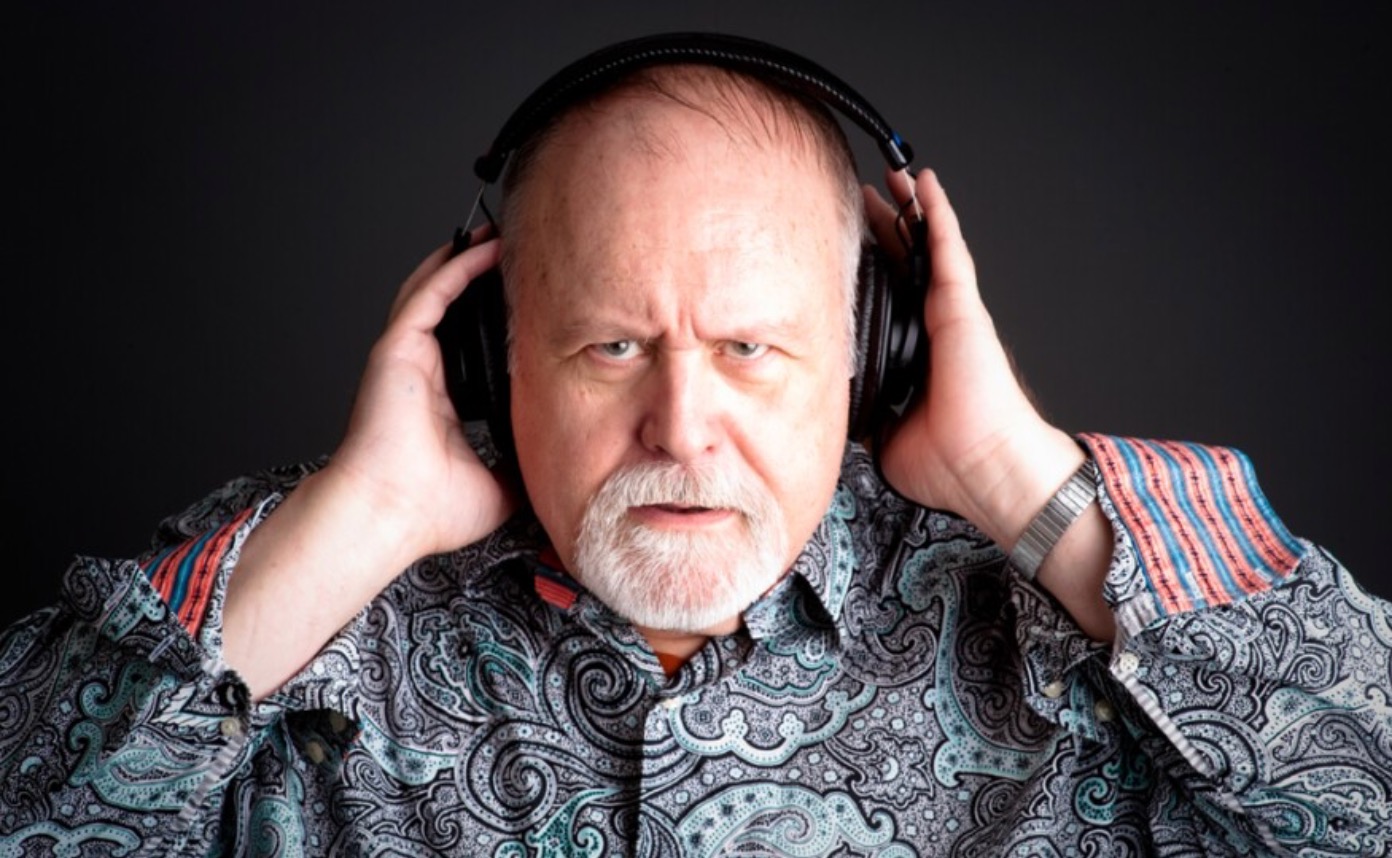
Photo: Michael Weintrob
Michael Bourne, long-time WBGO (FM) host of the Blues Break and the Singers Unlimited Shows died on Sunday, August 21st, 2022 at the age of 75. Bourne's knowledge and enthusiasm for the music was incredible and we consider to have been one of the greatest NYC radio personalities. He was also a contributing editor to DownBeat magazine.
The Blues Break (originally The Blues Hour) was one of the most popular shows on WBGO, proven by its expansion from one hour to two hours a number of years ago. Bourne had been with WBGO since 1984 and retired from full-time duties earlier this year. His death was a shock especially since he sounded so vital and youthful on the air. (posted 8/24/22)
Celebrating Pete Fornatale's Birthday
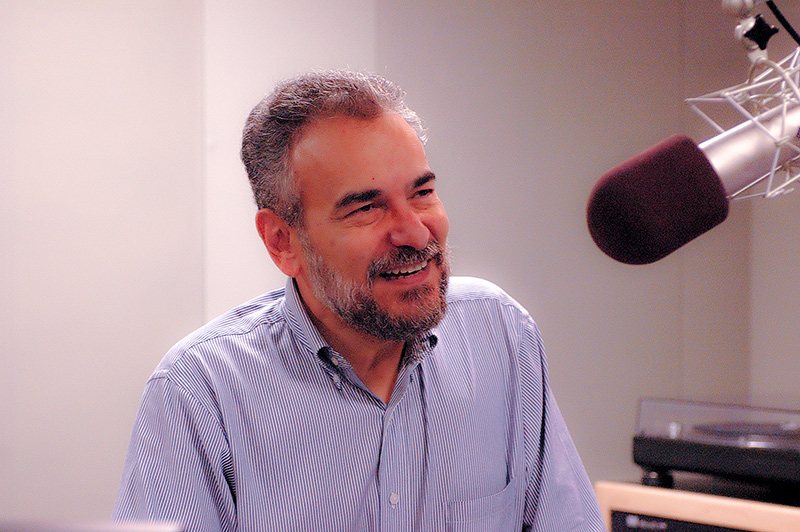
August 23, 2022 would have been Pete Fornatale's 77th birthday. Pete began his first college radio show, "Friday Musicale" on April 17, 1964. That show evolved into the "New Friday Musicale", then "Friday in New York", followed by "Swing Easy" and finally in November of 1964, "Campus Caravan", which actually lasted beyond the time he started at WNEW-FM on July 26, 1969.
There's many airchecks on this site of Pete at WFUV, WNEW-FM and K-Rock. In celebration of his birthday, here are photos from two special events. The first is from a presentation about Pete's "Bookends" book that also featured a Richie Furay (POCO) concert from November 12, 2011: Pete with Richie Furay.
The second is from a surprise Art Garfunkel concert held December 14, 2011: Pete with Art Garfunkel.. (posted 8/23/21, 8/20/22)
The History of the Car Radio
As should be obvious, most of the people who browse this site are people who remember listening to these stations and DJ's when they were younger. We also get slightly younger people who are interested in the history of rock/pop music and radio. And then we also often get inquiries from documentarians and media producers who want to use some of our findings in their own productions.
What we didn't expect was an email from a youth services librarian who is "running a fun radio and broadcating history class for 10-14 year olds." Kelly Ackford is running such a class. In that class is a young man named Dylan (appropriate name, right?) and he and his father decided to research the history of car radios and found the linked site which links to many different articles from different sources about the car radio.
So thanks to Ms. Ackford, Dylan and his dad.
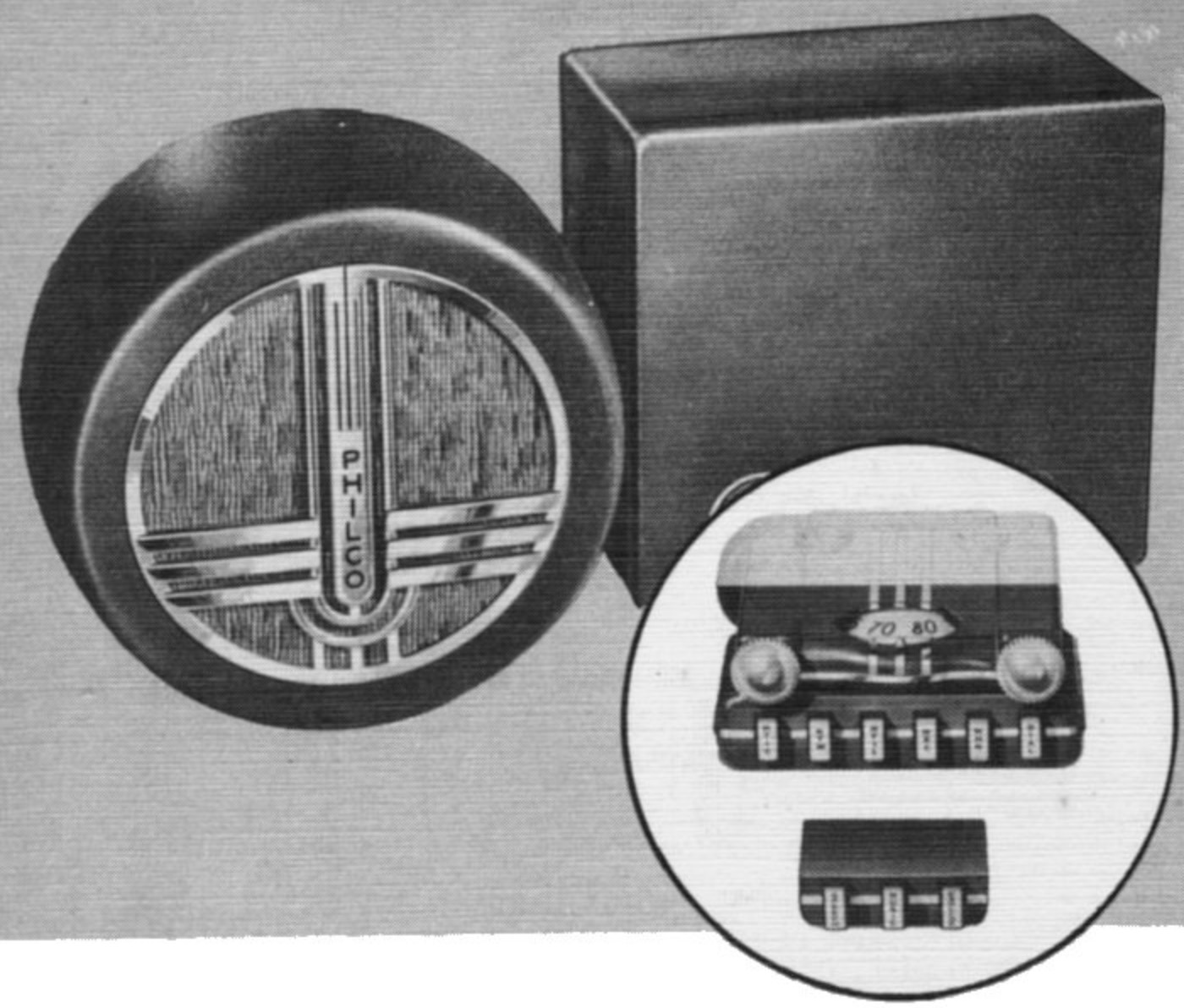
History of the Car Radio
WBAI Air Personality Larry Josephson dies
Larry Josephson, who hosted the morning show on WBAI when the station was at its peak, died Wednesdday, July 27th. He was 83. Along with Bob Fass and Steve Post, Larry was one of the creators of free-form radio. More at the article: (posted July 31, 2022)
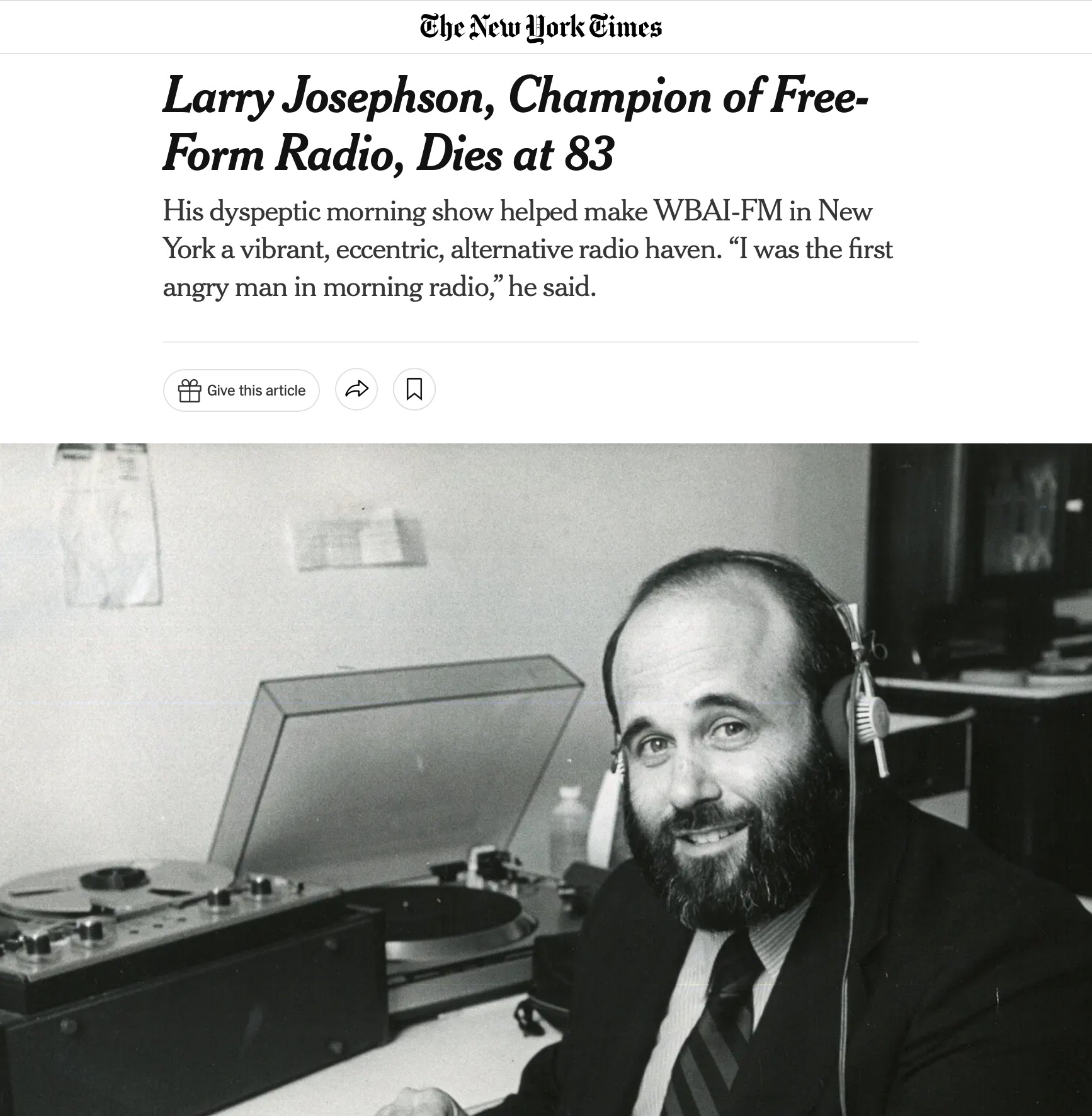
NY Times Obit
July 30th Marks the 56th Anniversary of the WOR-FM Rock Format
WOR-FM started broadcasting their rock format on Saturday, July 30th, 1966, 56(!) years ago.
When it first stopped simulcasting the AM and programmed pop music instead, it did so without air personalities due to a union dispute with AFTRA over setting a new minimum wage for FM DJs, somewhat puzzling as WNEW-FM had DJ's as part of their "All-Girls" MOR format (with Alison Steele having joined on July 4, 1966) and WOR-FM did air recorded promos of some of the DJ's.
Their initial branding was via a Milton Glaser design.

But it was hard to tell from the design whether it was going to be a true rock station or an FM station playing "beautiful music" versions of rock songs, since at the time, it was hard to imagine a full-time commercial rock station on FM.
While today we would decry their jockless programming as a jukebox (although not unlike streaming), it was a revelation back then. We were all used to WABC-AM, which never segued one track into another and almost always played at least one spot, usually more, between each song.
WOR-FM gave us much higher audio quality, fewer commercials, less formatics and continuous music and we loved it. And when listening at home with my newly acquired stereo system, we could hear the tracks in stereo! Standing near the Coney Island boardwalk with a transistor radio, we would high-five each other each time they played another track without a spot inbetween. It seemed miraculous (and ideal for taping).
But in spite of those advantages and aside from "early adopters", it would be a number of years before FM could claim significant market share, although it had very high quality Demos. WOR-FM would very quickly become the #1 FM station in the U.S. While WINS had switched to an all-news format 15 months before, WABC(AM) would remain the music powerhouse for many years to come and WMCA would continue their music format for another four years.
WOR-FM originally simulcast John Gambling until 10am, played music for 16 hours until 2am and then simulcast Barry Farber until 5:15 am.
In the early formative months, it still sounded like WOR-FM was going to be a top-40 radio station, albeit a slightly quieter and more mature one than what we were used to. The DJs wouldn't join until October 8th and the station would slowly evolve into a free-form radio station that played as many album tracks as singles. That would be a different revelation. But it lasted less than a year as Bill Drake was given responsiblity for programming all of the RKO-General stations except for WOR-AM. But that's another chapter in the WOR-FM story.
For more about the history of WOR-FM and a number of airchecks, click the WOR-FM page. (7/27/22)
WCBS-FM DJ Don K. Reed dies
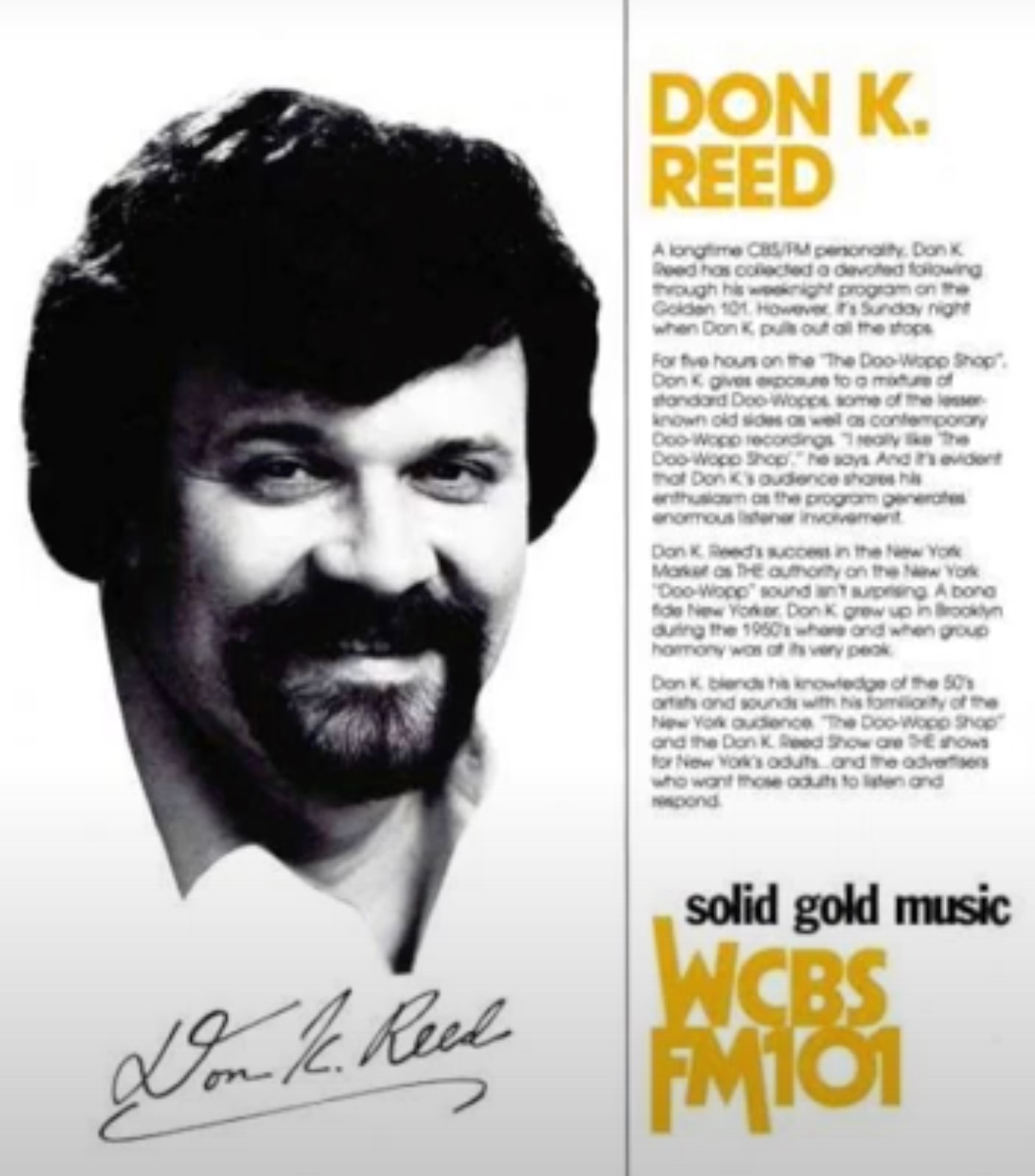
WCBS-FM former DJ, Don K. Reed, best known for the Doo-Wop Shop, has died. Beginning in 1972, Don held down the 10pm to 2am slot and moved to overnights in 1998. The Sunday night Doo-Wop Shop started in 1975 and lasted until 2002. Don deserves credit for being one of the few DJ's in NYC to preserve and present that 1950's music. Before WCBS-FM, Don was a DJ on WLIR. (posted July 17, 2022)
Dennis Elsas' Tribute to Pete Fornatale
Here's Dennis' tribute to Pete, but it's only available in the WFUV archive for the next two weeks.
You can listen to it here: Dennis Elsas tribute to Pete Fornatale
(posted 4/27/22)
Nat Asch, Original Program Director of WNEW-FM,
dies at 95
According to a profile Nat Asch wrote about himself that appears on the www.wnew1130.com website, he had been Sports Director at WMGM/WHN from 1949 and moved to WNEW-AM when they acquired the rights to the NY Giants football broadcasts in 1962. He was later responsible for special projects and was involved in Ted Brown returning to the station.
In 1966, Harvey Glascock became GM and offered Asch PD, but changed his mind and moved Gerry Graham, then News Director instead. But instead, Asch was offered PD of WNEW-FM where he moved witih George Duncan in 1966. They initially implemented the "all-girls" format in July, which brought Alison Steele to the station. In October of 1967, they hired Rosko, who had recently resigned from WOR-FM and the rest is history. Nat also played a large role in bringing Zacherely to the station in 1968 after asking his kids if they were fans. They were.
Nat Asch is not a household name, but he one of the fathers of free-form progressive radio, both for what he actively did and for what he just let happen. (posted April 6, 2022)
The State of the Record Business

The RIAA released the full-year 2021 North American recording industry sales numbers and there was some really terrific news: revenue increased 23.4% as compared to 2020 and both physical and streaming revenues increased. Amazingly, after years of decline, CD units grew substantially.
CD units at 46.6 million units were up 47.5% and vinyl LP's increased 67.5% in units and 61.2% in revenue, shipping 39.7 million units. But physical media is still just a very tiny portion of the overall business (11.3%). CD unit sales are still higher than LP sales (in spite of false press reports), but LP revenue is far higher at $1.038 billion vs. $584 million.
Downloads continue their slow decline in favor of streaming. Only 29.1 million albums (down 12.1%) and 209 million singles (down 16.1%) were downloaded. We have a generation that doesn't feel the need to own music, even digitally and there's not a lot of interest in albums. It's really too bad because unlike streaming, artists can make good money from streaming.
Streaming now constitutes 84.7% of the business (in dollars), digital downloads constitute 4% and physical media is 11.3% of the business.
While there will always be some boutique labels issuing physical media, there will be fewer CD releases over time, especially for newly signed acts. If there's some CD you always meant to buy, you'd better make that purchase because unless it was a really big hit, once it's out-of-stock, it's probably not going to be re-pressed (although the used market will go on forever since 14.87 billion CD's have been sold in the U.S. since its advent in 1983 (and 4.07 billion LP's since 1973). If just 10% of the CD's survive, that's still 1.48 billion.)
In 2019, the only North American plant to make lacquers for vinyl records burned down and probably will not reopen. That means that once U.S. cutting houses run out of their inventory of blank lacquers, few new vinyl records can be made unless another company decides to go into the business or a European or Asian company decides to expand operations.
The total U.S. music business was almost $15 billion (at list prices) in 2021 compared to $12.1 billion in 2020. It was $14.6 billion in full-year 1999, but adjusted for inflation, that $14.6 is the equivalent of $25 billion in 2021 dollars, making today's record business just 63% of its former peak. CD units peaked in 2000 at 942.5 million, LP units peaked in 1977 at 344 million and cassettes peaked in 1988 at 450.1 million units.
Between 1994 and 2000, except for 1997, over a billion albums were sold EACH year.
(posted 3/12/22)
The State of the Record Business: 2021 1st Half

The RIAA released the half-year 2021 North American recording industry sales numbers and there was some good news: revenue increased 27% as compared to first half 2020 and both physical and streaming revenues increased.
CD units at 16.1 million units were up 50.5% and vinyl LP's increased 86.8% in units and 94% in revenue, shipping 17 million units. But physical media is still just a very tiny portion of the overall business (10%). LP unit sales finally exceeded CD sales as many had falsely reported in the past, but is the reality now. LP/EP revenue was over twice CD revenue at $467.4 million
Downloads continue their slow decline in favor of streaming. Only 15.7 million albums (down 4.3%) and 114.4 million singles (down 12.2%) were downloaded. We have a generation that doesn't feel the need to own music, even digitally and there's not a lot of interest in albums.
Streaming now constitutes 85.4% of the business (in dollars), digital downloads constitute 4.6% and physical media is 10% of the business.
While there will always be some boutique labels issuing physical media, there will be fewer CD releases over time, especially for newly signed acts. If there's some CD you always meant to buy, you'd better make that purchase because unless it was a really big hit, once it's out-of-stock, it's probably not going to be re-pressed (although the used market will go on forever since 14.84 billion CD's have been sold in the U.S. since its advent in 1983 (and 4.05 billion LP's since 1973). If just 10% of the CD's survive, that's still 1.48 billion.)
In 2019, the only North American plant to make lacquers for vinyl records burned down and probably will not reopen. That means that once U.S. cutting houses run out of their inventory of blank lacquers, few new vinyl records can be made unless another company decides to go into the business or a European or Asian company decides to expand operations.
The total U.S. music business was $7.054 billion (at list prices) in first-half 2020 compared to $5.553 billion in first-half 2019. It was $14.6 billion in full-year 1999, but adjusted for inflation, that $14.6 is the equivalent of $24 billion in 2021 dollars, making today's record business just 61% of its former peak. CD units peaked in 2000 at 942.5 million, LP units peaked in 1977 at 344 million and cassettes peaked in 1988 at 450.1 million units.
Between 1994 and 2000, except for 1997, over a billion albums were sold EACH year.
(posted 9/16/21)
Dennis Elsas Celebrates 50 Years On The Air this Month
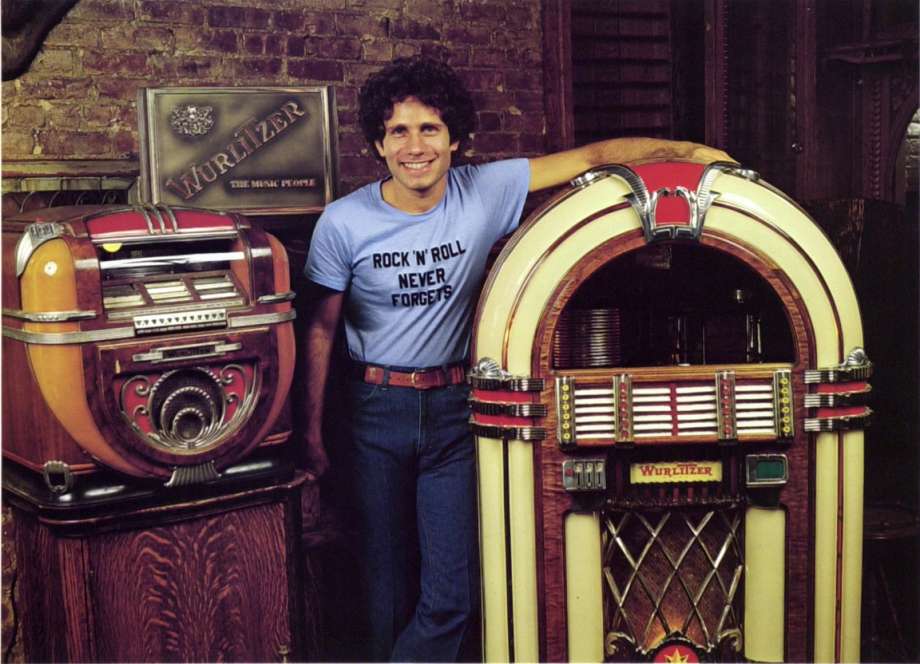
Veteran NYC DJ, Dennis Elsas, who current works the mic at both WFUV and Sirius/XM, celebrates his 50th anniversay in New York radio. He did his first overnight shift at WNEW-FM in July of 1971 and he was on college radio even before that.
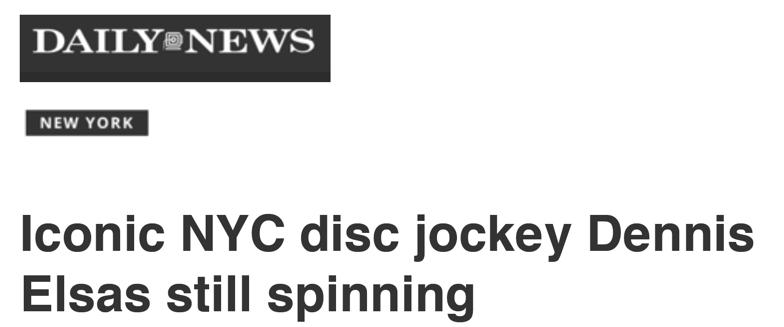
Click for full article
Article at Radio Online
50th Anniversary Aircheck at WFUV
Bob Fass dies at 87
Fass was a pioneer on WBAI, creating what would later be known as free-form radio and introducing his late-night listeners to non-mainstream artists (many of whom would later become mainstream) and to both local and national politics, giving many their first taste of a politial education.
While rarely given credit, Bob Fass and Steve Post, another radio personality on WBAI, were the fathers of free-form, politically oriented, highly local radio.
Click on the image for the NY Times Obit.
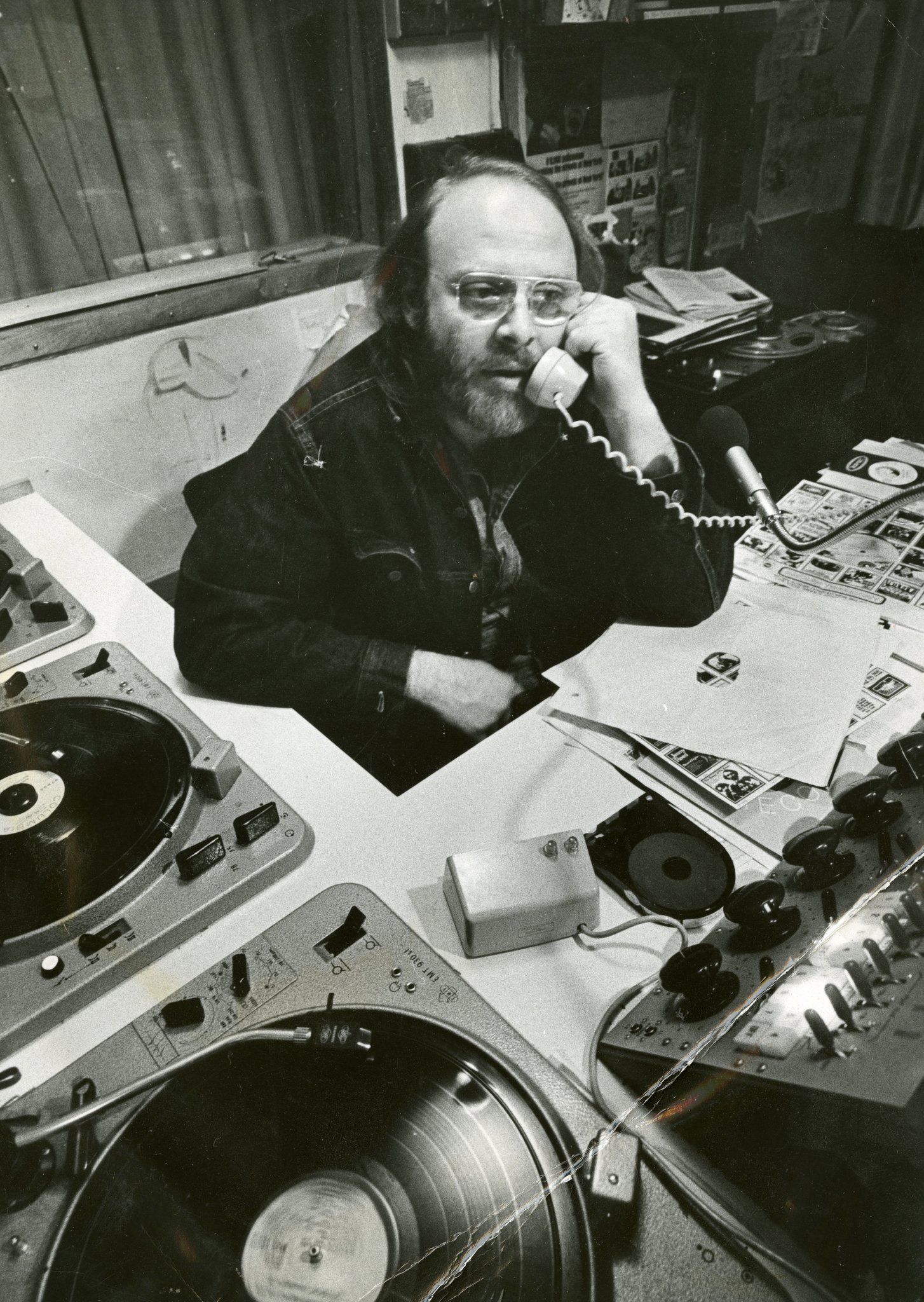
NY Times Obit
And here's info about the Radio Unnameable documentary, a film about Bob Fass' long-running radio show on WBAI. (posted 4/25/21)
Record Store Day
Information on Record Store Day can be found at: Record Store Day
In spite of the vinyl hype, great record stores are an endangered species, so instead of complaining about their demise, go visit one and buy something. NYC isn't the same since we lost Tower Records, Virgin and J&R as well as Vinyl Mania and the Times Square Record Shop in the 42nd st subway station, which was famous for its collection of vocal groups and doo wop.
And it's really tough when one thinks back to the days when almost every neighborhood had a record shop and records were also sold in most appliance and department stores. Each record store had their own vibe. NYC-based baby boomers will also remember the original Sam Goody's, Record Hunter, Disc-o-Mat and the record departments at Alexander's and Korvette's department stores, among many others. For me, growing up in the Bronx, it was Spinning Disc records on the Grand Concourse near Fordham Road as well as Cuzin's and another shop across the street on the south side of Fordham Road that still had listening booths and an outdoor speaker that sounded so incredibly good, it actually used to make me sweat.
The largest record shop in NYC today is Rough Trade in Williamsburg, Brooklyn.
While it might be a chicken-and-egg syndrome, anyone who thinks we don't need physical retail should take into account that the U.S. music market is now 54% of its former peak size (adjusted for inflation), in spite of the incredibly deep stock available on e-commerce sites. And that includes downloads and streaming.
And if you're interested in some great gently-used vinyl: LP Vinyl Music is our sister site where you can buy great vinyl, including unique and rare radio documentaries and interviews, as well as some DVD and Blu-ray titles. (updated 4/8/21)
The 72nd Anniversary of the 45 RPM Record
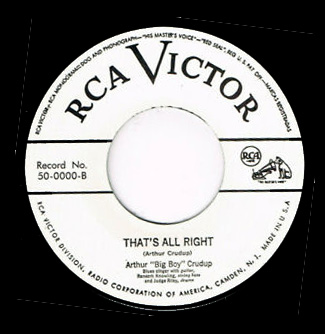
RCA, in competition with Columbia's LP, released the first 45RPM record on March 15, 1949. (The LP was introduced in June of 1948.) Among the first singles was Arthur "Big Boy" Crudup's "That's All Right", covered some years later by Elvis Presley, and a Yiddish song sung by a cantor. Singles originally listed for $1 ($11.05 in 2021 dollars) and were sold at discounters for around 65 cents ($7.18 in 2021 dollars).
The peak year for the single was probably 1973, according to RIAA data, when it sold around 228 million units. By 1977, when LP units peaked, single sales had dropped to 190 million units. By 1983, the first year CD's were issued, 125 million 45's were sold. They dropped below 100 million for the first time in 1986 and below 50 million in 1989, largely due to the emergence of cassette singles ("cassingles") of which 76 million were sold in that year. Vinyl singles dropped below 10 million in 1997 and below 5 million in 2000. In 2014, 500,000 were sold and after that, the RIAA stopped reporting their sales because the numberes were so small.
But many have forgotten just how great singles were: they had the potential for greater fidelity than an LP, due to their greater speed; they tended to be mastered at very hot levels that creaed an over-modulated sound and they were EQ'd differently than their LP counterparts, so it's the 45 RPM mono singles that are considered to be the canon version of most classic hit songs. Attempts have been made to master compilation CD's to sound like the original singles, but it's rarely accomplished. (posted 3/31/21)
DJ Ray White dies at 69
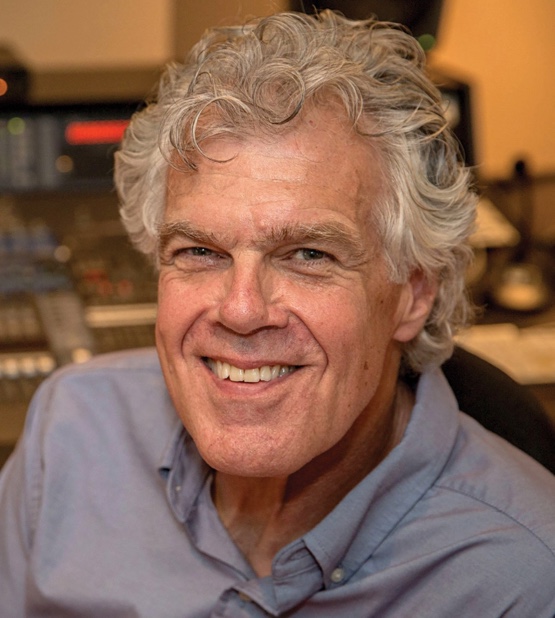
Ray White, who was a DJ at many stations, including WNEW-FM and WLIR, passed away on March 7, 2021 from cancer. In NYC, Ray was on othe air at WAPP, WNEW-FM, WQCD and WLIR, which helped launch the careers of such artists as Joan Jett and Billy Joel. He then relocated to San Francisco where he worked for KKSF, KFOG, KQED and Classical KDFC, before joining Colorado Public Radioo Classical in 2019.
Article on the CPR website: Ray White
posted 3/9/2021
The State of the Record Business: 2020

The RIAA released the full year 2020 North American recording industry sales numbers and there was some good news: revenue increased 9.2% as compared to 2020, but the decline of physical media has continued.
CD units at 31.6 million units were down 33.5% but vinyl LP's increased 23.8% in units and 29.2% in revenue, selling 22.9 million units. But physical media is still just a very tiny portion of the overall business (9.6%) and LP unit sales did not exceed CD sales as many have reported, but LP revenue at list prices has finally exceeded CD revenue
Downloads continue their decline in favor of streaming. Only 33.1 million albums were downloaded. We have a generation that doesn't feel the need to own music, even digitally and there's not a lot of interest in albums.
Streaming now constitutes 84.7% of the business (in dollars), digital downloads constitute 5.7% and physical media is now just 9.6% of the business.
While there will always be some boutique labels issuing physical media, there will be fewer CD releases over time, especially for newly signed acts. If there's some CD you always meant to buy, you'd better make that purchase because unless it was a really big hit, once it's out-of-stock, it's probably not going to be re-pressed (although the used market will go on forever since 14.8 billion CD's have been sold in the U.S. since its advent in 1983 (and 4 billion LP's since 1973). If just 10% of the CD's survive, that's still 1.48 billion.)
In 2019, the only North American plant to make lacquers for vinyl records burned down and probably will not reopen. That means that once U.S. cutting houses run out of their inventory of blank lacquers, few new vinyl records can be made unless another company decides to go into the business or a European or Asian company decides to expand operations.
The total U.S. music business was $12.153 billion (at list prices) in 2020 compared to $11.13 billion in 2019. It was $14.6 billion in full-year 1999, but adjusted for inflation, that $14.6 is the equivalent of $22.6 billion in 2020 dollars, making today's record business just 54% of its former peak. CD units peaked in 2000 at 942.5 million, LP units peaked in 1977 at 344 million and cassettes peaked in 1988 at 450.1 million units.
Between 1994 and 2000, except for 1997, over a billion albums were sold EACH year.
(posted 3/9/21)
Rita Houston 1961-2020
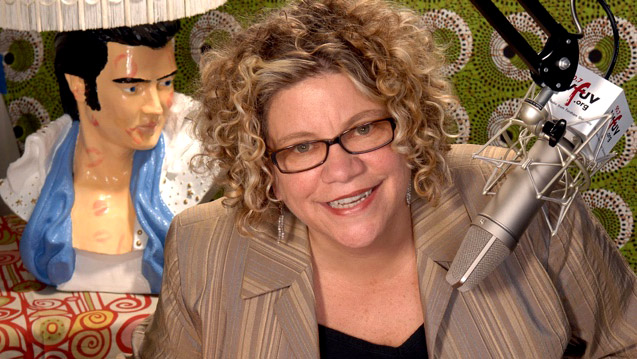
Rita Houston, the program director and DJ at WFUV, passed away today, December 15th, after a long battle with cancer. She joined WFUV in 1994 was always an extremely enthusiastic supporter of independent, quality music and radio. Chuck Singleton, manager of WFUV wrote, "Rita was the north star of WFUV's sound and its public service, guiding the station's musical direction for decades. She was a New York original, a trailblazing woman of exceptional talent who shaped a unique style behind the microphone - informed and informal, intimate, warm, genuine. But also, one of tremendous joy." She will definitely be missed by those who knew her personally and the artists and audience she supported for decades. (posted 12/15/2020)
The State of the Record Business: 2020 1st Half

The RIAA released the first half 2020 North American recording industry sales numbers in September and there was some good news: revenue increased 5.6% as compared to first half 2019, but the decline of physical media has accelerated.
CD units were down 43% and vinyl LP's increased just 2.3% in units and 3.6% in revenue in spite of all the vinyl hype. But physical media is still just a very tiny portion of the overall business (6.8%) and LP sales did not exceed CD sales as an article in Rolling Stone claimed and was repeated constantly elsewhere.
Just 10.6 million CD units were sold (942.5 million were sold in full-year 2000). LP sales, frequently hyped as the savior of the record industry, sold just 8.8 million units.
Downloads continue their decline in favor of streaming. Only 16.9 million albums were downloaded in the first half. We have a generation that doesn't feel the need to own music, even digitally and there's not a lot of interest in albums.
Streaming now constitutes 86.8% of the business (in dollars), digital downloads constitute 6.4% and physical media is now just 6.8% of the business.
While there will always be some boutique labels issuing physical media, there will be fewer CD releases over time, especially for newly signed acts. If there's some CD you always meant to buy, you'd better make that purchase because unless it was a really big hit, once it's out-of-stock, it's probably not going to be re-pressed (although the used market will go on forever since 14.8 billion CD's have been sold in the U.S. since its advent in 1983 (and 4 billion LP's since 1973). If just 10% of the CD's survive, that's still 1.48 billion.)
In 2019, the only North American plant to make lacquers for vinyl records burned down and probably will not reopen. That means that once U.S. cutting houses run out of their inventory of blank lacquers, few new vinyl records can be made unless another company decides to go into the business or a European or Asian company decides to expand operatons.
The total U.S. music business was $11.11 billion (at list prices) in 2019. It was $14.6 billion in full-year 1999, but adjusted for inflation, that $14.6 is the equivalent of $22.45 billion in 2019 dollars, making today's record business just under half of its former peak. It was $5.653 billion in first half 2020.
It should be noted that between 1994 and 2000, except for 1997, over a billion albums were sold EACH year. (posted 10/24/20)
Jonathan Schwartz Returns to (Streaming) Radio
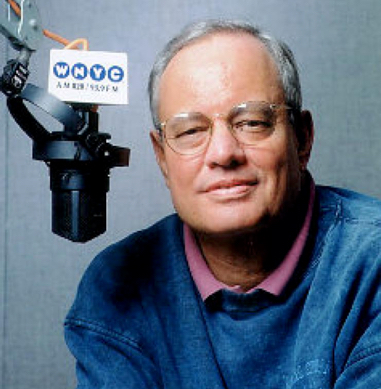
The American Songbook returns to radio (sort of) as Jonathan Schwartz's channel is live and streaming. Schwartz left WNYC under controversial circumstances in December of 2017. Schwartz will be 80 years old in June (2019). He was on the air in New York for 50 years from 1967. He has also performed in New York cabarets, has authored five books and recorded three albums.
Schwartz announced that his February 20th, 2021 show would be his last. But the Jonathan channel is still streaming the American Songbook.
The Kate & Vin Scelsa Podcast

After Vin Scelsa retired from WFUV, fans wondered if they'd hear his very personal style of radio again. Over the last year, he's joined with his daughter Kate and produced 13 podcasts out of "Studio V" in his home.
A number of the episodes include segments that deal directly with the history of radio: Episodes 3-5 include a history of WFMU, Episode 7 has a section on ABC-FM and Episodes 12 and 13 include segments about Zacherley and WPLJ.
Link here: The Kate & Vin Scelsa Podcast
As of a check on April 8, 2021, these podcasts no longer seem to be active.
Bruce Morrow has returned to WABC(AM)
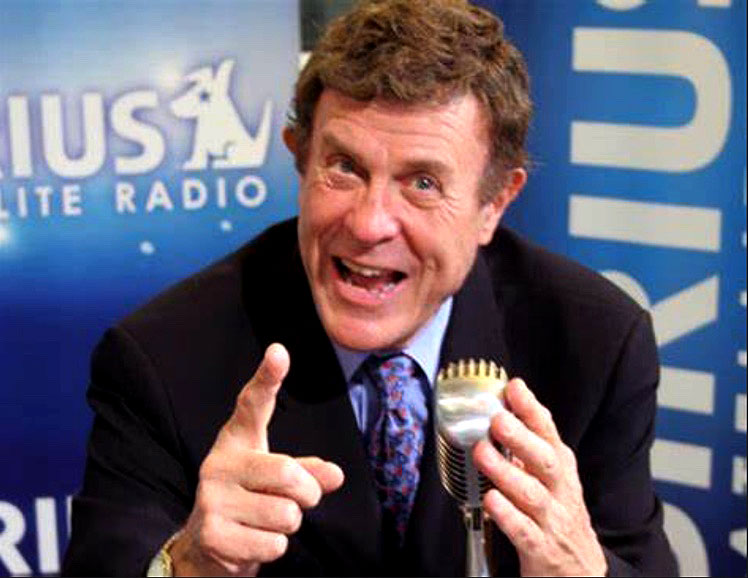
Bruce ("Cousin' Brucie") Morrow has returned to WABC radio on Saturday nights from 6-10pm. He's heard over-the-air on WABC-AM 770 and WLIR-FM 107.1 in Hampton Bays and streaming on the WABC app and at www.wabcradio.com.
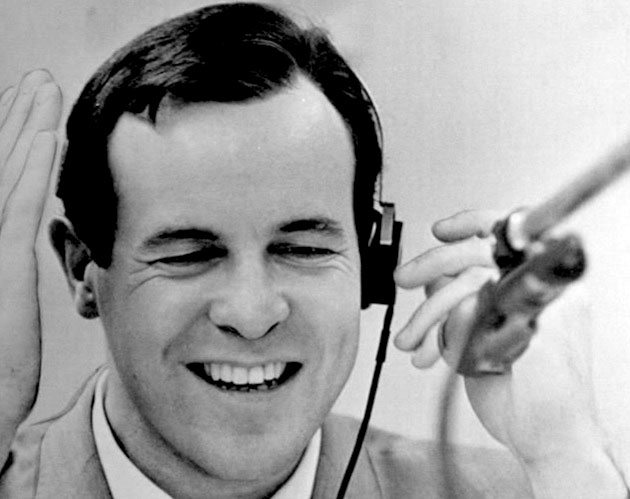
Bruce in his WABC days.(circa 1961)
Morrow recently left Sirius/XM satellite radio after a 15 year tenure there. He began his professional career in Bermuda, where he was known as "The Hammer". He first appeared on the NYC airwaves at WINS in 1958, but left shortly after Murray the K arrived. He moved to WINZ in Miami before returning to NYC and joining WABC on August 28, 1961. By 1962, the lineup included Herb Oscar Anderson, Charlie Greer, Sam Holman, Dan Ingram, Scott Muni and Bob Lewis. He left in August of 1974 and moved to WNBC, replacing Wolfman Jack. He left in 1977 and became an owner of numerous radio stations with Robert F.X. Sillerman. In 1982, he started working primarily weekend shifts at "Oldies" WCBS-FM and stayed until 2005 when the station switched to the Adult Hits JACK format. He joined Sirius slightly after, hosting two programs per week. (Posted 8/11/2020, revised 12/13/20)
“It Was 53 Years Ago Today...that 'NEW-FM Started to Play...”

Rosko's first show on WNEW-FM was on the evening of October 30th, 1967. The station used to like to say that their anniversary was Halloween, but it was actually the night before. Alison Steele was already with the station as part of the "All Girls" MOR format (she joined on July 4, 1966). Jonathan Schwartz would join on November 16, 1967 and Scott Muni on December 18th. What most people don't realize is that during the first few weeks of the rock format, Alison was scheduled during the day between Jonathan Schwartz doing 10-1pm and Muni doing 4-7. But in December, Schwartz would extend his show until 2pm, Muni took over the 2pm to 7pm shift until early 1968 and Alison moved to midnight starting January 1, 1968.
As far as we're concerned, WNEW-FM had about 14 amazing years as a free-form station and was still pretty good compared to everyting else for years after, even though it was more tightly programmed. In July of 1995, the station went Alternative in an attempt to play more new music as it originally had, but it lost a third of the audience. It became a Classic Rock station in January of 1997. The station became quite ill when Opie & Anthony started in August of '98 and it died on November 13th when Scott Muni was fired, although the station still played some semblance of music until the station went to the "Hot Talk" format full time on September 13, 1999. More on the WNEW-FM page.
The State of the Record Business: 2019

The RIAA released the final full-year 2019 North American recording industry sales numbers a few weeks ago and there was some good news: revenue increased 13% as compared to 2018.
CD units were down 10.6% and vinyl LP's increased 14.4% in units and 18.7% in revenue (probably due to large boxed sets). But physical media is still just a very tiny portion of the overall business (10.6%) and LP sales did not exceed CD sales as an article in Rolling Stone claimed and was repeated constalty elsewhere.
Just 46.5 million CD units were sold (942.5 million were sold in full-year 2000). LP sales, frequently hyped as the savior of the record industry, sold 19.1 million units.
Downloads continue their decline in favor of streaming. Only 40.2 million albums were downloaded compared to 49.7 million in 2018. We have a generation that doesn't feel the need to own music, even digitally.
Streaming now constitutes 81.5% of the business (in dollars), digital downloads constitute 7.9% and physical media is now just 10.6% of the business.
While there will always be some boutique labels issuing physical media, I can see a time within the next few years that labels start phasing out the CD. If there's some CD you always meant to buy, you'd better make that purchase because unless it was a really big hit, once it's out-of-stock, it's probably not going to be re-pressed (although the used market will go on forever since 14.79 billion CD's have been sold in the U.S. since its advent in 1983. If just 10% survive, that's still 1.48 billion.)
Not mentioned by the RIAA, because it happened only recently, but the only North American plant to make lacquers for vinyl records burned down and probably will not reopen. That means that once cutting houses run out of their inventory of blank lacquers, few new vinyl records can be made unless another company decides to go into the business or a European or Asian company decides to expand operatons.
The total U.S. music business was $11.112 billion (at list prices) in 2019. It was $14.6 billion in full-year 1999, but adjusted for inflation, that $14.6 is the equivalent of $22.46 billion in 2019 dollars, making today's record business just under half of its former peak.
It should be noted that between 1994 and 2000, except for 1997, over a billion abums were sold EACH year. (posted 4/16/20)
The State of the Record Business: 2019 1st Half

The RIAA released the first-half 2019 North American recording industry sales numbers and there is some good news: revenue increased 18% as compared to first-half 2018, CD units were flat (first time in years that they didn't decline) and vinyl LP's increased 6.2% in units and 12.8% in revenue (probably due to large boxed sets). But physical media is still just a very tiny portion of the overall business.
Just 18.6 million CD units were sold (942.5 million were sold in full-year 2000). LP sales, frequently hyped as the savior of the record industry, sold just 8.6 million units which if doubles for the full-year will bring us back to just above 2015's 16.9 million.
Downloads continue their decline in favor of streaming. Only 20.4 million albums were downloaded compared to 26.3 million in first-half 2018. We have a generation that doesn't feel the need to own music, even digitally.
Streaming now constitutes 82% of the business (in dollars), digital downloads constitute 8.8% and physical media is now just 9.2% of the business.
While there will always be some boutique labels issuing physical media, I can see a time within the next few years that labels start phasing out the CD. If there's some CD you always meant to buy, you'd better make that purchase because unless it was a really big hit, once it's out-of-stock, it's probably not going to be re-pressed (although the used market will go on forever since 14.76 billion CD's have been sold in the U.S. since its advent in 1983. If just 10% survive, that's still 1.47 billion.)
The total U.S. music business was $5.385 billion (at list prices) in first-half 2018. It was $14.6 billion in full-yearr 1999, but adjusted for inflation, that $14.6 is the equivalent of $22.46 billion in 2019 dollars, making today's record business just 48% of its former peak, although 2019 looks like it's going to be the fourth year of growth. (posted 9/19/19)
NY Times: Alt Rock Radio in the age of Spotify

Interesting article from the NYTimes on the sound of 92.3 WNYL "New York's New Alternative" in the age of Spotify. Click on the image for the article.
The State of the Record Business: 2018

The RIAA released the final 2018 North American recording industry sales numbers and there is some good news: revenue increased 11.9% as compared to 2017. But for those who still care about physical media, there's only bad news.
Just 52 million CD units were sold, down 40.7% from 2017's 87.7 million. (942.5 million were sold in full-year 2000). LP sales, frequently hyped as the savior of the record industry, increased 7.1% in units and 7.9% in dollars with 16.7 million units sold compared to 2017's 15.6 million, but still below 2015's 16.9 million.
Downloads continue their decline in favor of streaming. Only 49.7 million albums were downloaded compared to 66.4 million in 2017. (On the other hand, that 49.7 million downloaded albums is very close to the number of CDs sold.) We have a generation that doesn't feel the need to own music, even digitally.
Streaming now constitutes 77% of the business (in dollars), digital downloads constitute 10.9% and physical media is now just 12.1% of the business.
While there will always be some boutique labels issuing physical media, I can see a time within the next few years that labels start phasing out the CD. If there's some CD you always meant to buy, you'd better make that purchase because unless it was a really big hit, once it's out-of-stock, it's probably not going to be re-pressed (although the used market will go on forever since 14.74 billion CD's have been sold in the U.S. since its advent in 1983. If just 10% survive, that's still 1.47 billion.)
The total U.S. music business was $9.85 billion in 2018. It was $14.6 billion in 1999, but adjusted for inflation, That $14.6 is the equivalent of $22 billion in 2018 dollars, making today's record business just 44.7% of its former peak, although 2018 was the third year of growth.
WCBS-FM Returns to Playing True Oldies
WCBS-FM announced today, April 1, 2019, that they're going to return to being a true oldies station once again, playing hit music from the 1950's to the 1970's. "We've felt like we were performing a disservice to our audience by implying we were an oldies station, but never really playing any," said General Manager Lawrence Dogan. "We brought in McKinsey, the huge consulting firm to see whether our restricted playlist hurts or helps the size of our audience, the time spent listening and our ad revenue and they came to the conclusion that playing a wider variety of music could only have positive impact. We were confused because for generations, the radio industry has concluded that the desired audience would not listen to older music and that one could only gain large audiences if they played a very restricted set of music."
The lead researcher on the study, Dr. Donald Demento said, "we conducted the widest study ever done in the New York Metropolitan area on audience music listening habits. We evaluated the personal music collections of over 1 million people, half of whom regularly listen to over-the-air radio and half who do not. We analyzed every track they listened to on alternative services such as satellite radio and streaming services as well as over-the-air radio. We also tracked volume levels to determine whether people were listening in the background or foreground. We measured pulse rates while they listened. A study like this has never been accompished before."
The peer-reviewed study, which will be published in the July-August issue of the JOM (Journal of Memes), overturns years of radio industry practice. When asked if the study could be considered valid in light of the years of experience by radio executives, Dr. Demento replied, "I can assure you that the results of our study are 100% valid as they have been scientifically proven beyond a doubt. We've even figured out why radio executives of the last 35 years have made the decisions they've made and it's actually quite shocking: all of the rules they've used to program their stations are based upon heresay - they heard someone else say that they can't play 80 great songs a week or that older people are harder to sell to or that people actually wanted to hear 20-minute stop sets and that Kars-For-Kids commercial. It's ridiculous - kids don't need cars as they're not old enough to drive and the insurance would be outrageously expensive." When asked to evaluate the performance of radio executives and consultants, Dr. Demento replied, "oh, it's quite simple really - our study conclusively proves using AI modeling, mathematical analysis conducted by scientists from M.I.T. and computations made on server farms larger than the state of Rhoide Island that they don't know what the fuck they're doing. But our computations also analyzed their positive professional attributes and concluded that they'd be fantastic in a slightly diffrent career: they would be quite successful at being meter maids." Demento added, "actually that's a little unfair. I shoudn't let my emotions get ahead of the research conclusions. The best of them would be good in another career: giving enemas."
So starting on April 1st, WCBS-FM will be changing their format. GM Lawrence Dogan expressed some concerns: "I have to tell you that while we're pleased with the extensive research, we're quite nervous about the implementation. For years now, every member of our team has been tasked with making the sound of our station as boring as possible and by making the stop sets as annoying as possible. Now they're all being asked to actually make radio entertaining again. I have faith that we can pull it off, but it's going to be a herculean task." Program Director PD James agreed. "For years, we wouldn't play "What's Going On" by Marvin Gaye and "Lola" by the Kinks on the same day. Now we're being told we CAN play them on the same day and that we won't lose audience. How can that possibly be? When a person listens over a course of a few hours and doesn't hear the Marvin Gaye song six times and hears the Kinks song instead of the repetitions, aren't they going to get upset? I don't know if I can think that logically. Frankly, I've always wanted us to play only five different songs in any given day. That way, there's no danger that any of the songs we play wouldn't be a gigantic hit or wouldn't be familiar."
There were also dissenting views from the advertising industry. Frederick Asswipe sent us the following statement: "For years, we've been trying to destroy quality radio because we need only idiots to listen because it's idiots who believe our advertising. If radio is going to once again attract intelligent people, it's going to destroy the entire advertising industry. We think Congress needs to act."
Well the joke might be on them. The new format starts April 1st.
Pete Fornatale Tribute
We lost the great Pete Fornatale seven years ago on April 26, 2012. Here's a short YouTube video of an event held in his memory in 2013 that includes the audio of the first commercial he read on WNEW-FM: a spot for the Woodstock Festival.
Jim Kerr Inducted into the National Radio Hall of Fame
On November 15th, long time NYC DJ Jim Kerr was inducted into the National Radio Hall of Fame. Kerr is a brilliant air personality who has worked almost every format. He begain in NYC on WPLJ in March of 1974 after working in Detroit radio. He left WPLJ in 1978 for a short stint at WPIX-FM and then returned to PLJ where he stayed until the Spring of 1989 through several format changes. From 1990 to 1993 Kerr did mornings at WYNY. He returned to Jazz 101.9 WQCD sharing the morning show with Pat Prescott in 1997. Jim has been the morning man at Q104.3 Classic Rock for many years.
Jim joins past NYC associated inductees Allan Freed, Bruce Morrow, Don Imus, Rick Sklar, Hal Jackson, Wolfman Jack, Murray the K, John A. Gambling, Mel Karmazin, Jean Shepherd, Scott Shannon, William B. Williams, Dan Ingram, Wendy Williams, Howard Stern, Barry Farber, Ira Glass, Scott Muni and Robin Quivers.
Dan Ingram Inducted into the New York State Broadcasters Hall of Fame
Dan Ingram was inducted into the National Radio Hall of Fame in 2007. He was inducted this year into the New York State Broadcasters Association Hall of Fame. All I can say is, "what took them so long?"
They seem to have started the Hall of Fame in 2007. Inductees of relevance to NYC radio are Hal Jackson and Bruce Morrow in 2007, Harry Harrison in 2009, Scott Muni in 2010, Scott Shannon in 2012 and Funk Flex in 2013.
Larry Berger dies
We don't have many details as yet, but Larry Berger, former program director of WPLJ from 1974 to 1988 has passed away. Larry took over responsibility for the AOR format and for changing the format to CHR in 1983 with an appeal to 25 to 44 year-old women. Larry was a radio pro who will be missed.
Early in Larry's career he was Music Director at WWRL and followed that as Program Director at WALL-AM in Middletown, NY. By 1973, he had become Program Director of WABC's WRIF in Detroit, but quickly moved to WPLJ in September of 1974. After he left WPLJ in 1988, he programmed KSOL and KIOI in San Francisco. (posted 10/24/2018)
Dan Ingram dies at 83
Dan Ingram, perhaps the greatest top-40 DJ of all time, died Sunday, June 24th at the age of 83. Dan was best known for his long tenure at WABC-AM, but prior to that he did stints at WICC, Bridgeport; WNHC, New Haven; KBOX, Dallas and WIL, St. Louis before joining WABC on July 3, 1961 and where he would stay until May 10, 1982 when the station changed to a talk format. After the FCC ruling in 1966 that FM stations in large cities could no longer simulcast the AM programming on FM, at the urging of Bob Lewis, Dan hosted "The Other Dan Ingram Show", a one-hour Saturday night show on WABC-FM beginning in October of '67, but those specialty shows were gone by March of 1968 when WABC-FM changed to an automated rock format.
After a short stint at WKTU from January to July of 1985, he joined Oldies WCBS-FM in October of 1991. He would stay there until June of 2003 when management wanted to cut his on-air time to just one show per weekend.
Dan was best known for his ad-lips, puns, quick sense of humor and brilliant pacing. The National Radio Hall of Fame called him "a radio pioneer and considered by some to be the best Top 40 DJ of all time." (posted 6/25/2018)
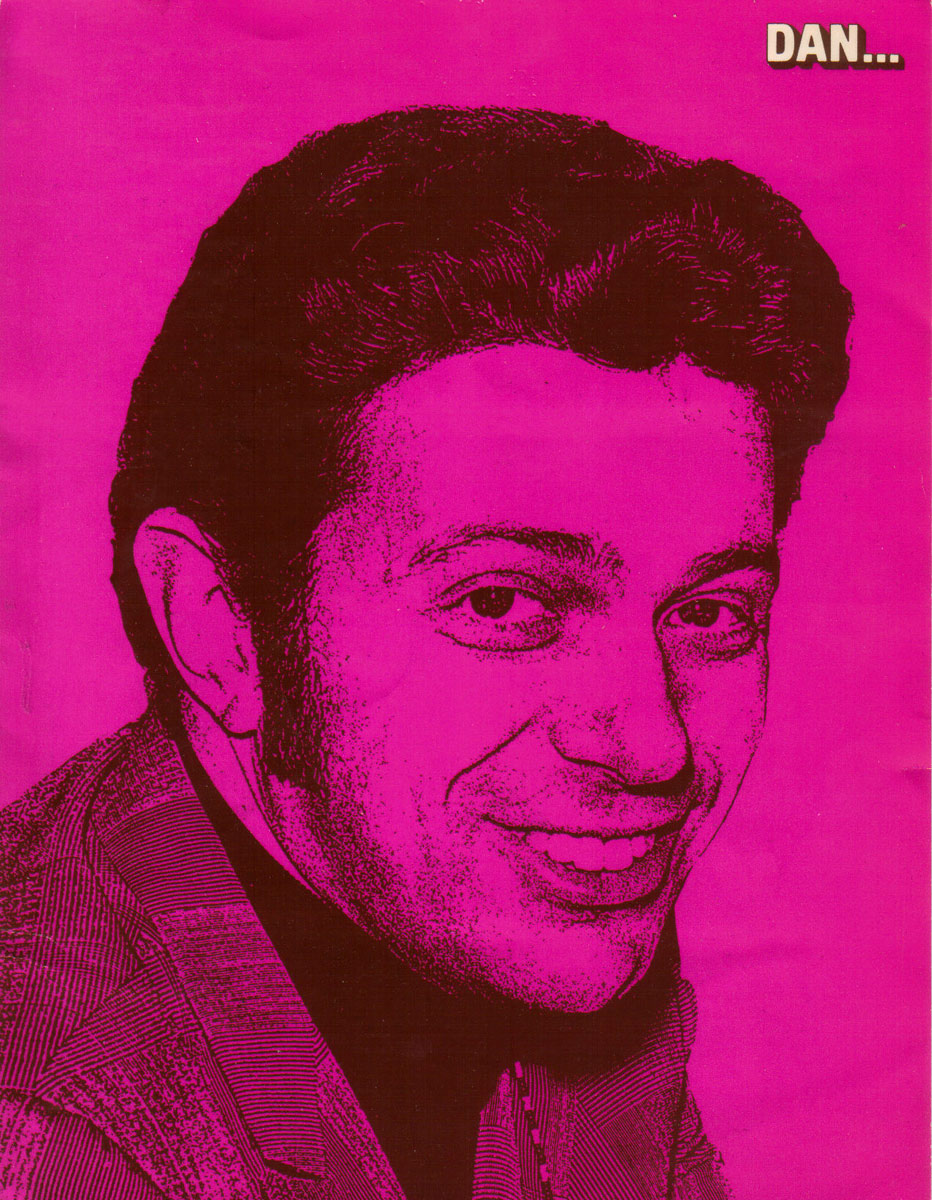
Dan Ingram circa 1969.
Columbia University's WKCR
Here's an interesting article from the student newspaper at Columbia University about WKCR, the campus radio station that most students apparently don't know exists:
Posted 12/11/2017
The State of the Record Business: 2017

The RIAA released the final 2017 U.S. recording industry sales numbers and there is one bit of good news: for the second year in a row, revenue increased. It rose 16.5% after increasing 9% in 2016. Those are the first increases since 2011. But for those who still care about physical media, there's only bad news.
Just 87.6 million CD units were sold, down 10.2% from 2016's 97.6 million. (942.5 million were sold in 2000). LP sales, frequently hyped as the savior of the record industry, increaed 5.4% in units and 9.3% in dollars with 15.6 million units sold compared to 2016's 14.3 million, but still below 2015's 16.9 million.
Even downloads are on the decline in favor of streaming. 66.4 million albums were downloaded compared to 85.1 million in 2016. Downloaded albums were down 22% and downloaded singles, of which 553.5 million were sold, were down over 25%. We're raising a generation that doesn't feel the need to own music, even digitally.
Streaming now constitutes almost 67% of the business (in dollars), digital downloads constitute 15.7% and physical media is now just 17.6% of the business.
While there will always be some boutique labels issuing physical media, I can see a time within the next few years that labels start phasing out the CD. If there's some CD you always meant to buy, you'd better make that purchase because unless it was a really big hit, once it's out-of-stock, it's probably not going to be re-pressed (although the used market will go on forever since 14.6 billion CD's have been sold in the U.S. since its advent in 1983).
The total U.S. music business is now just $8.7 billion. It was $14.6 billion in 1999, but adjusted for inflation, that $14.6 is the equivalent of $21.8 billion in 2017 dollars, making today's record business just 40% of its former peak.
Radio Is Great Again!
In an unprecedented move, under the auspices of the National Association of Broadcasters Committee created to restore radio's position in the cultural consciousness, iHeart, Entercom, Cumulus, Emmis, Hubbard, Tribune, the Spanish Broadcasting System, Univision, Disney, Pamal, Salem and Inner City have jointly agreed to bring back full service personality based-radio and give on-air music personalities the freedom to choose 75% of the records played. Under the new arrangement, consultants and voice-tracking are banned and syndicated shows are only permitted after midnight during the week and after 9pm on weekends.
In addition, they have agreed to reduce spot loads to just 8 minutes per hour and to stop targeting specific demographics. On a lottery basis, the stations have agreed to bring back jazz, R&B, Latin, Zydeco, standards, show music, country, blues, oldies, classical, international and progressive rock formats to all cities with more than 250,000 people and to devote 2% of airtime to live performances. Those companies whose holdings include talk stations have agreed to have all talk show hosts be evaluated by a psychologist for signs of paranoia and to provide them with training as to what constitutes a fact. Aluminum foil hats will be banned from broadcast facilities. Blaming former U.S. President Barack Obama for everything will be banned after June 30th, 2018 as will calling for the jailing of former Secretary of State Hillary Clinton. WBAI will give up its license which will be taken over by Viacon's Comedy Central in the interests of consistency. WNYC's "All Things Considered" will stop considering all things, which is expected to reduce road rage. (posted 4/1/2018)
Radio Engineer Eric Small dies at 71
Eric Small, an engineer, founder of Modulation Sciences Inc. and co-developer of the Optimod FM processor, was killed Thursday, March 15th, when he was hit by an out-of-control car in Delray Beach, Florida. Industry insiders credit Eric with "rescuing" WOR-FM from the TV engineers who cared far more for the TV operation than the FM operation and which eventually resulted in a great sounding station. His work in the 80's became the gold standard in radio audio processing. Small partnered with Bob Orban to develop the Optimod 8000, which worked quite differently than previous processors. He was also on the committee that wrote the standard for TV stereo sound. He was also praised for showing up at the Alpine, NJ broadcasting facilty (the Armstrong Tower) after 9/11 to help broadcasters get back on the air.
Small started his career in 1964 at WNCN-FM, the classical music station that is now Q104 Classic Rock. Five years later, he joined the tech department at A&R Recording and worked for Phil Ramone and he eventually became chief engineer at WXLO (formerly WOR-FM). Thanks to Joseph Honerkamp for some of the information contained in this item. (posted 3/20/2018)
Radio Love Fest at BAM March 7th-10th
Radio Love Fest will take place at the Brooklyn Academy of Muisc from March 7th to 10th.
This year's events include Brooke Gladstone interviewing Neil Gaiman, a discussion with the creators of the "S-Town" podcast, Neil deGrasse-Tyson talking science, Ira Glass and a live episode of The Moth. Info may be found on the BAM site:

The 50th Anniversary of the Bill Drake format on WOR-FM
November 4, 2017 marks the 50th anniversary of the day that WOR-FM fully switched to the Bill Drake top-40 format. The first group of DJ's included Hal Mitchell, Sebastian Stone, Tony Taylor, Jim O'Brian, Bob Elliot and Steve Clarke. But Rosko was already on the air at WNEW-FM and in 12 more days, Jonathan Schwartz would join him. (Posted 11/4/17)
The 50th Anniversary of Rock on WNEW-FM is Right Now!
Rosko's first show on WNEW-FM was on Monday, October 30, 1967 starting at 7pm EDT, exactly fifty years ago tonight. It began an experiment that would last in somewhat varying forms for 31 years until November 13, 1998, when Scott Muni was let go from the station, although there would still be some music until September 13, 1999. (Posted 10/30/17 6:45pm EDT)
Vin Scelsa Returns to Radio (for one day)
Vin Scelsa celebrates the 50th anniversary of his first appearance on WFMU on Sunday, November 5th from 12 noon to 3pm, when he joins Jonesey & X. Ray on the air. WFMU can be heard at 91.1 in New York and 90.1 in the Hudson Valley and online at WFMU.org
DJ and Actor Jay Thomas dies at 69
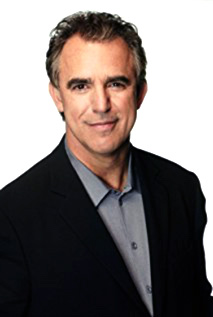
Actor and radio DJ Jay Thomas died Thursday, August 24, 2017 at the age of 69. Born Jon Thomas Terrell, he had an extensive career on radio, television and movies. Thomas' early career included a stint at WAYS 610AM in Charlotte, North Carolina. By the mid-1970's, he was heard on 99X and by 1979 on WKTU. He also did stints on K-Rock and Power 105. In 1986, after being fired from his K-Rock morning show, he moved to Los Angeles and was heard on KPWR Power 106 where he stayed until 1993.
Thomas also had an acting career appearing in 20 episodes of "Mork & Mindy" from 1979 to 1981. He also appeared on some episodes of "The Love Boat", nine episodes of "Cheers" as hockey player Eddie LeBec from 1987 to 1989 and in nine episodes of Murphy Brown from 1989 to 1998 where he won a primetime Emmy award for outstanding guest actor in a comedy series. He's also remembered for his supporting role as coach Bill Meister in "Mr. Holland's Opus" with Richard Dreyfus. He also made appearanes in "Hercules", "Fantasy Island", "Law and Order", "The Santa Clause" movies, "Boston Legal", Ray Donovan" and many others. And he was also an annual guest on the David Letterman show where he liked to tell a story about meeting Clayton Moore, who played The Lone Ranger on television in the 1950's.
Thomas can be heard on this aircheck, talking to Howard Stern by telephone after Thomas was fired from K-Rock in January of 1986: Thomas on Stern:
The State of the Record Business: 2016

The RIAA finally released the final 2016 U.S. recording industry sales numbers and at least insofar as physical media is concerned, things aren't looking too good. In fact, they even revised 2015 numbers downwards. While the overall business did rise over 11% in dollars from last year (the first increase since 2011), the business is half what it was in 1999 (even including streaming, downloading, etc.) and is just one-third of its former peak if one adjusts for inflation.
CD's sold just 99.4 million units, down 17% from 2015's 119.9 million. (942.5 million were sold in 2000). LP sales, frequently hyped as the savior of the record industry, were up just 1.8% in units and 3.7% in dollars with 17.2 million units sold, which is quite nothing when one considers that there are 117 superhit albums that sold upwards of 10 million each. In fact, Michael Jackson's "Thriller" has sold 33 million units in the U.S. all by itself. That one album (although CD sales are included in that number) is twice the size of the entire LP industry in the U.S.!
86 million albums were downloaded. By the end of this year, downloaded albums will probably exceed the number sold on CD, even though downloading is in decline in favor of streaming. Downloaded albums were down 21% and downloaded singles, of which 751 million were sold, were down almost 25%. We're raising a generation that doesn't feel the need to own music.
Streaming now constitutes almost 53% of the business (in dollars), digital units (downloading) constitutes 25% and physical media is now just 22% of the business.
While there will always be some boutique labels issuing physical media (a few acts are actually issuing cassettes again), I can see a time within the next three years that labels start phasing out the CD. If there's some CD you always meant to buy, you'd better make that purchase because unless it was a really big hit, once it's out-of-stock, it's probably not going to be re-pressed (although the used market will go on forever).
UPDATE: The first half 2017 numbers have been released and there's not much good news. Just 35.2 million CD's and 7.2 million LP's were sold in the first half. Only kiosks and streaming have showed increases. Streaming now takes 64.1% of the industry dollars, downloads take 19.6% and physical media takes just 16.3%. Once again, the numbers for the previous year were revised downward.
Jim Kerr celebrates 50 Years in Radio

Jim Kerr, who first came to prominence in New York on WPLJ, beginning in March of 1974, has appeared on many NY stations hosting a variety of formats. He's currently the morning man on Q104 and has been in radio for 50 years! In February of 1967, he began at WYNZ in Ypsilanti, Michigan.
The Month The Music Died
Among all the other troubles in the world, this has not been a good month for those who still revere the "fathers" of our music. As I'm sure everyone knows by now, we lost Chuck Berry yesterday (Sunday, March 18) at the age of 90. His first hit recording, "Maybelline", recorded in 1955, still sounds great today. Berry was originally discovered and mentored by pianist Johnny Johnson, but Berry soon took over the band. Unlike many of the other early stars of rock and roll, Berry wrote most of his own songs and his humor and meter has never been matched. John Lennon was quick to point this out when he guest-hosted the Mike Douglas show in the 1970s and featured Berry.
Berry's career was dormant after 1960, but revived after the Beatles and Rolling Stones recorded many of his songs (and the Beach Boys stole "Sweet Little Sixteen" for "Surfin' USA" for which they eventually had to give Berry credit). While charts don't do a very good job of reflecting influence, Berry had 27 charted singles on the Pop Charts with three in the top ten and 23 on the R&B charts with 14 in the top 10. His second biggest selling single was late in his career: a live recording of "My Ding-A-Ling" (backed by the Average White Band) and released in 1972. Berry had actually recorded a version of the song in 1966 as "My Tambourine", but it was originally recorded by Dave Batholomew in 1952. But Berry will be better remembered for the canon of "Roll Over Beethoven", "School Days", "Rock & Roll Music", "Sweet Little Sixteen", "Johnny B. Goode", "Carol", "Nadine", "No Particular Place to Go" and others.
While not as famous, we also lost bluesman James Cotton, who died on March 16th in Texas at the age of 81. Cotton played in Howlin' Wolf's early band in the 1950's and also recorded for Sam Phillips at Sun Records. Beginning in 1955, he played with Muddy Waters and by 1965, formed his own band. His first album was produced by Mike Bloomfield and Nick Gravenites, who later formed The Electric Flag. Even more so than Berry, Cotton's charted records don't represent his influence, but he charted twice with the "James Cotton Blues Band" LP on Verve in 1967 and "100% Cotton" on Buddah in 1975. Two of his later albums were Grammy nominees: "Giant", released on Alligator Records in 2010 and "Cotton Mouth Man" in 2013. Cotton got frequent play on the better free-form and progressive rock stations of the late 60's and early 70's and he often appeared at the Fillmore East and Fillmore West.
And we also last master record producer Tommy LiPuma, who died on March 13th at the age of 80. LiPuma worked with George Benson, Paul McCartney, Miles Davis, Barbara Streisand, Dr. John, Al Jarreau and many others. The albums he produced sold more than 75 million copies. He was recognized with 33 Grammy nominations and 5 wins. LiPuma began his record industry career in Cleveland, where he worked for a local record distributor. By 1961, he did promotion and eventually publishing at Liberty Records and produced demo sessions for Randy Newman and Jackie DeShannon. In 1965, he joined A&M where he produced hits for Chirs Montez and the Sandpipers. In 1968, he formed Blue Thumb records with Bob Krasnow and recorded such acts as Dave Mason, Ike & Tina Turner, Gabor Szabo, the Pointer Sisters and the Jazz Crusaders. In the 70's he produced Barbara Streisand at Columbia and George Benson at Warner. In the late 70's at Horizon, an A&M imprint, he worked with Dr. John and Brenda Russell. From 1979 to 1989 back at Warner, he worked with Michael Brecker, David Sanborn, Miles Davis and Randy Newman. His biggest success came with producing Natalie Cole's "Unforgettable... With Love" album, which sold over 7 million copies. In the 1990's he produced many albums for Diana Krall and in the 2000's he worked with Willie Nelson, Joe Sample, Barbara Streisand and many other great artists.
These were all giants (unlike the many forgettable acts of today) and those in the know will miss them deeply.
Talk Radio Host Alan Colmes dies at 66
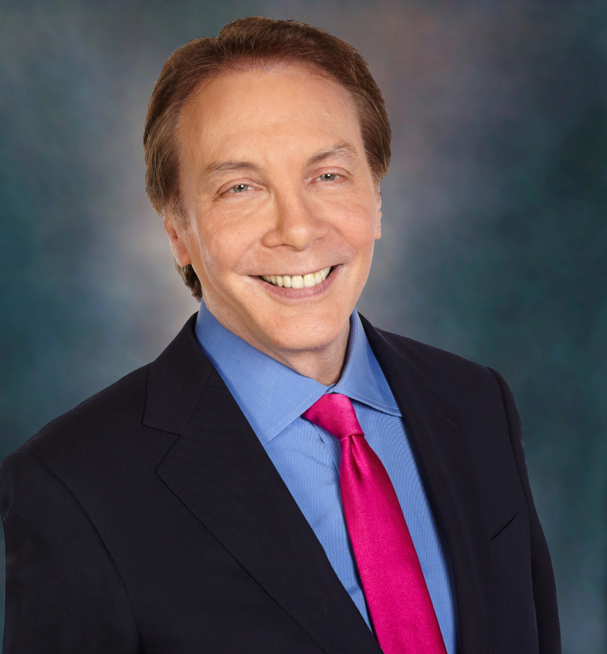
Talk show host Alan Colmes has died at the age of 66 from lymphoma (February 23, 2017).
Holmes, a New York native, began his career in stand-up comedy, but wound up working in talk radio and did stints at WABC, WHN, WNBC, WEVD and WMCA in New York, WHNC in New Haven and WZLX and WEZE in Boston.
He was hired for morning drive on WABC and moved to WNBC in 1987 where he stayed until it became WFAN. In 1996, he was hired by Fox News CEO, Roger Ailes, to be the "liberal voice" of Fox News and was paired with Sean Hannity from Fall 1996 to early 2009. After leaving that show, he continued as a commenator on Fox. He was also the author of two books, "Thank the Liberals For Saving America" and "Red, White & Liberal: How Left is Right & Right is Wrong".
Holmes was sometimes criticized for not being as strong as Hannity and there were claims that he wasn't given as much time to interview guests, but Holmes felt that being on Fox was far more exciting than 'preaching to the choir'.
Radio Love Fest at BAM February 8-11th, 2017
Radio Love Fest will take place at the Brooklyn Academy of Muisc from February 8th to 11th, 2017.
This year's event includes live broadcasts of "The Moth Radio Hour", "Wait, Wait, Don't Tell Me", "Snap Judgement" and others. Info may be found on the BAM site:

Herb Oscar Anderson dies at 88 on January 29, 2017
We've lost another one of the greats. Herb Oscar Anderson, best known for his years on WABC-AM, died Sunday, January 29, 2017. "HOA" as he was known, joined WABC in December of 1960 in the 7-11am spot replacing Al Lohman. He was there for all of WABC's powerhouse years - when they almost always topped the ratings.
Befor joining WABC, Anderson worked at WROK in Rockford, Illinois, WBBO in Orlando and WBBM in Chicago. In the late 1950's, Herb hosted a show on the ABC network during the waning days of live entertainment radio - he sang with a band on the air.
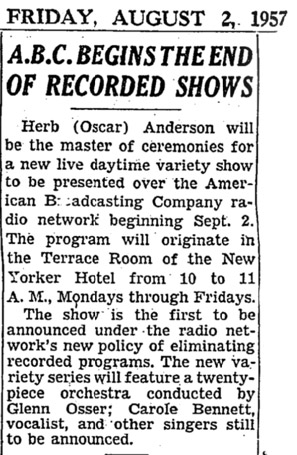
But he soon left that show and joined WMCA, originally in an afternoon shift, later doing mornings. Anderson was at WMCA during the same era that Scott Muni was there. In late 1960, he joined WABC right around the time they launched the top-40 format and became the "Morning Mayor" with his theme, "Hello, Again". He left WABC in the Fall of 1968 but still kept making appearances and doing radio shows on stations local to where he was living until very recently. He'll be missed.
NY Times Obit:
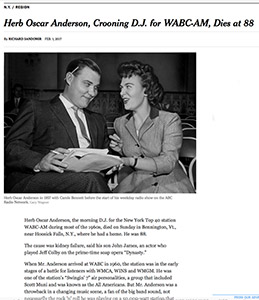
WBGO to Increase Online Profile
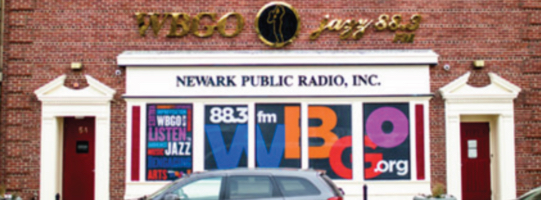
The NY Times reports that WBGO, the public radio Jazz station based in Newark at 88.3 is going to substantially increase its online profile by hiring jazz critic Nate Chinen to manage its editorial content. WBGO is the second-highest-rated jazz station in the country, with an audience of about 375,000 people. (posted 1/12/2017)
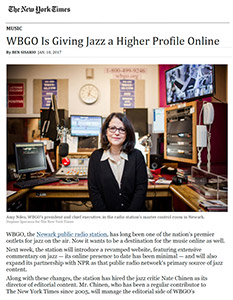
Rich Conaty dies at 62
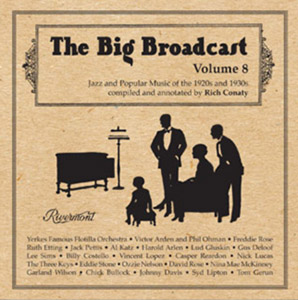
Rich Conaty, the host of WFUV's "The Big Broadcast", died on December 30, 2016 at the age of 62. While Rich did not play rock music, he had the heart of the best of the progressive rock and free-from DJ's: he played a broad swath of music, he had an academic's expertise regarding that music and he tried to both inform and entertain. And perhaps more importantly, he kept three decades of now seldom-heard music alive.
While I personally do own a few compilations and some Louis Armstrong recordings from the eras he played, I'm certainly not a big fan of that music. And yet, listening to his show on Sunday nights was akin to meditation. It was a wonderful mellow end to the week and enabled one to get ready for the new one. It wasn't nostalgia, because I didn't grow up in that era, but it felt nostalgic just the same.
Rich started the show on WFUV in 1973 when he was a freshman there. It ran for over 40 years and 2200 hundred editions of the program. In 1983, he moved to weekends on WNEW-AM and in late 1992, he hosted "The Big Bandstand" on Saturdays. In 1997, he brought the show back to WFUV. Conaty also annotated 11 CD compilations of music of the 1920's and 30's that are still available on Rivermont Records. Much of this music would hardly still exist at all if it wasn't for Conaty.
At last listen, WFUV was still playing his show. That's a good thing, although I'd like to see them edit the show so it becomes "The Best of The Big Broadcast".
Here's the NY Times take on Rich Conaty:
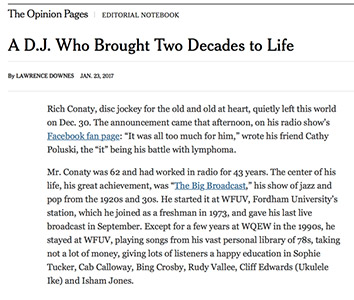
Nat Hentoff dies at 91
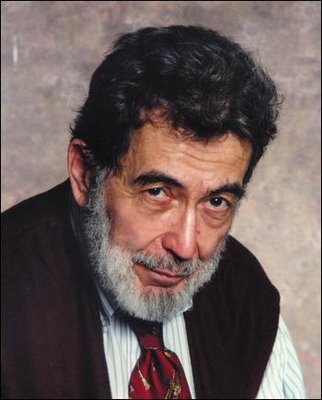
Journalist, historian, syndicated columnist, jazz critic and broadcaster Nat Hentoff died Saturday, January 7th, at the age of 91. Hentoff has written for Jazz Times, Downbeat, The Washington Post, the Village Voice, The Wall Street Journal and many other publications. Hentoff started as a broadcaster in the late 1940's on WMEX in Boston. He was also heard on WGBH-FM and in New York on WABI-FM, where he co-hosted "The Scope of Jazz". For several years in the mid-1970's, Hentoff hosted the syndicated radio show, "In Conversation" two nights a week. (Other hosts included Richard Reeves, Paul Finney and Gerard Piel.) On this show, Hentoff covered politics, culture, music and the environment.
Hentoff covered both sides of the political spectrum. He was a political leftist and a staunch defender of the Constitution, but he was totally opposed to abortion rights and political correctness.
Here's an example of Hentoff's work on the "In Conversation" program. Here are two segments where he interviewed another man of many talents, Steve Allen, from November of 1975. (Note that the intro and the end of the second segment is missing.) Allen covers his years on television, comments on other TV talk show hosts and on the comics of the day, including Mort Sahl, Lenny Bruce and Richard Pryor.
This show was originally broadcast on WOR-AM on November 4-5, 1975 and also syndicated on several hundred commercial and non-comnmercial radio stations throughout the U.S.
The Memorial Service For Zach
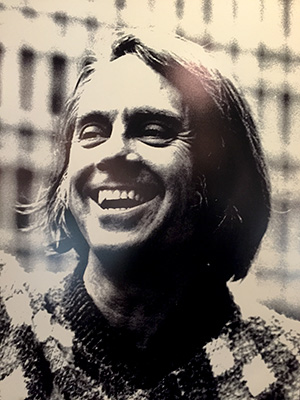
A memorial service was held on November 14 for John Zacherley, who died at age 98 on October 27, 2016. Great stories were told by people about Zach, mostly about how kind and generous he was and how he kept his sense of wonder his entire life.
One story had Zach walking on the streets of New York when a 'fan' came over and pointed and said, "You're John Zacherley!" Zach pointed back and said, "You're Paul Simon!"
Here's some photos displayed at the service:
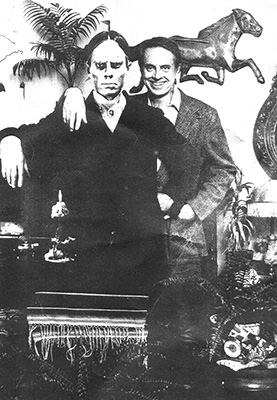
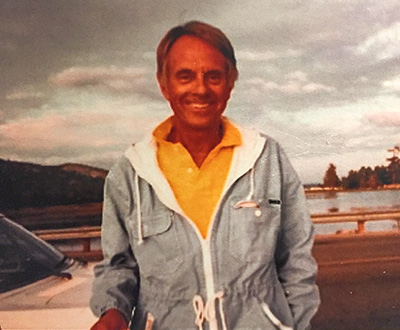
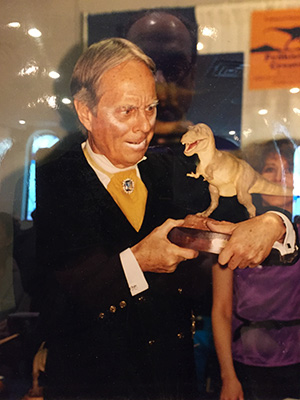
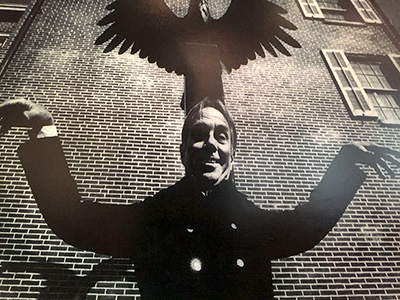
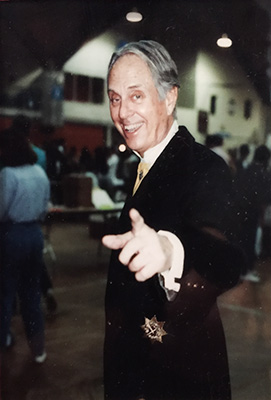
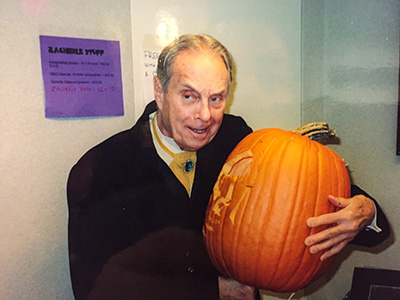
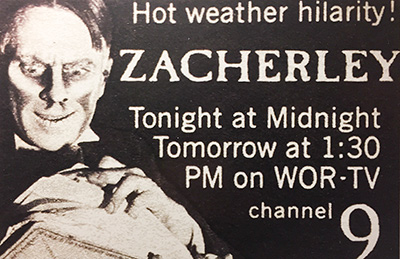
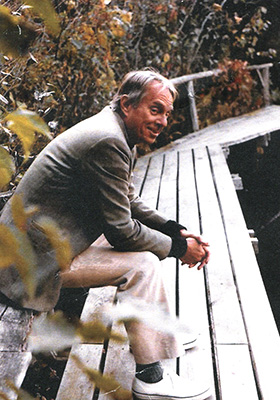
Oscar Brand Dies at 96
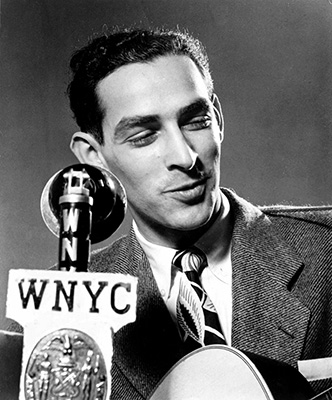
Oscar Brand, whose radio show "Folksong Festival" has been broadcast by WNYC for more than 70 years, died September 30th, 2016 at the age of 96. His last broadcast was just a week ago.
But Oscar was far more than a radio host. He released almost 100 albums and is credited with composing over 300 songs. Although Candadian born and having moved to Minneapolis and then to Chicago as a boy, he eventually moved to Brooklyn and attended Erasmus Hall High School and Brooklyn College.
His radio show debuted on December 10, 1945 and has run continously since, making it the longest running radio show with a single host. He played host to Huddie Leadbetter, the Weavers, Pete Seeger, Joni Mitchell, Joan Baez, Bob Dylan, Woody Guthrie and many other folk luminaries.
He was unfairly named as a Communist sympathizer by Red Channels magazine in 1950 because he played and hosted blacklisted artists. And he was one of the founders of the original Newport Folk Festival.
Here's the NY Times Obit (click on the image):
Paul Cavalconte does WOR-FM
Paul Cavalconte's show tonight (Saturday, October 8th, 2016) will be devoted to the WOR-FM anniversary. You can listen on 90.7FM or streaming on the web at WFUV website from 8-10pm. Many of the airchecks were contributed by our good friend Rob Frankel and others "borrowed" from this site.
If you missed it, it should be up on the WFUV archive starting Monday, October 10th and reside there for about two weeks.
Bobby Rydell at the 92nd Street Y on July 27th
Bobby Rydell may not be a household name to everyone today, but he had 30 charted hits between 1959 and 1965. He was part of the Cameo/Parkway flock of singers. "Wild One" hit the charts on February 1, 1960 peaked at #2 and stayed on the charts for 16 weeks. He also appeared in the movies "That Lady From Peking" and more famously, "Bye, Bye Birdie". And of course, "Bobby Rydell High School' was a 'character' in Grease.
Bobby's written an autobiography, "Teen Idol on the Rocks" and he'll be discussing that book with Rolling Stone contributing editor Anthony DeCurtis and singing some songs at the 92nd Street Y on July 28th.
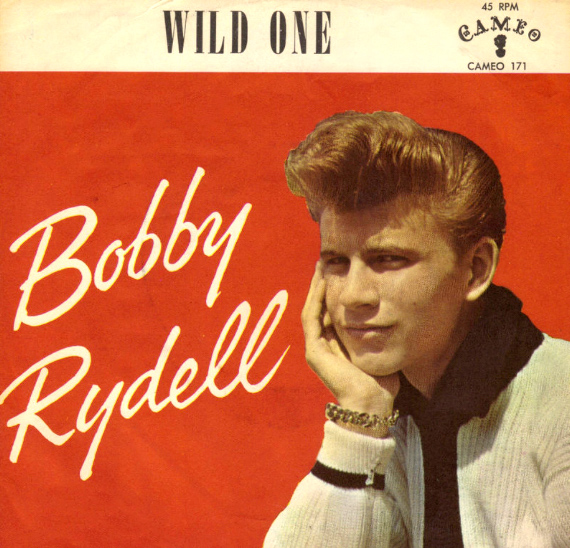
"Dandy" Dan Daniel Passes Away
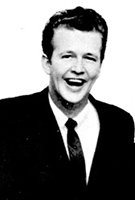
One of the original WMCA "Good Guys", Dan Daniel passed away today, June 21, 2016, after falling in his home yesterday. He started at WMCA on August 18, 1961, but before that he appeared on Armed Forces Radio, at KXYZ, Houston and at WDGY, Minneapolis. He appeared on WMCA until 1970 and later worked at WYNY-FM, WHN and WCBS-FM. He'll be missed. Here's a tribute posted by Art Vuolo:
WFMU Record Fair to be held April 29 - May 1
The annual WFMU Record Fair will be held Friday April 29th to Sunday May 1st, 2016 at the Brooklyn Expo Center - 79 Franklin Avenue in Greenpoint, Brooklyn. Early entry on Friday from 4-7pm is $25 and also provides admission all weekend. Reguar admission on Saturday and Sunday is $7.
Information may be found here.
The End of Broadcasting
April 1, 2016: CBS Inc. has announced that they intend to sell or spin-off the radio group...Cumulus Media's stock price target is cut to 75 cents from $3 at Capital...iHeart Media is trading at $1.11, down from a 52-week high of $8.00.
April Fools D...oh, wait a minute. That's not a joke, that's real.
Ron Jacobs dies at age 78
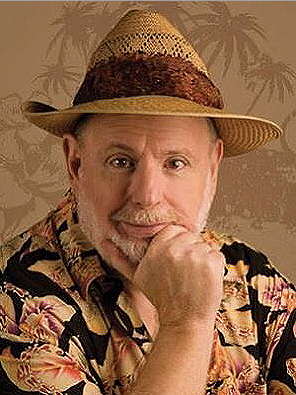
Ron Jacobs, a giant of top-40 radio, died in Hawaii on March 8th. While his name is not all that familiar to New Yorkers, he was one of the people responsible for "Boss Radio" and the sound of KHJ, which he started programming with Bill Drake in 1962 and where he was also a featured DJ. He also produced "The History of Rock & Roll" and was involved with Watermark's "American Top 40". He also produced the series of LPs called "Crusin': A History of Rock 'n Roll Radio" which re-created the sound of various top-40 radio stations, including the songs, jingles and commercials. He started his career in Hawaii and has lived there for many years. He'll be missed - he was one of the more talented people who worked in top-40 radio.
The History of Rock & Roll may be heard at this link.
Radio Love Fest will be held March 10-12th at BAM
Radio Love Fest is a multi-day festival presented by WNYC and BAM featuring live tapings of shows like "Wait Wait....Don't Tell Me!", "Death, Sex & Money" and "The Moth"; curated film screenings; live music; and more.
Information may be found here.
Bob Elliot dies at 92
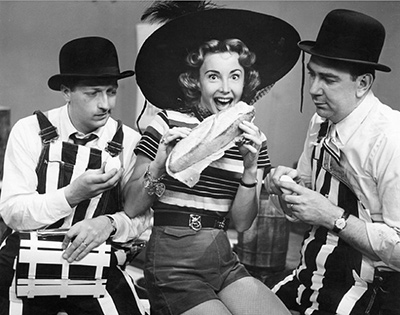
Bob Elliot & Ray Goulding with Audrey Meadows from 1951
While not a music or progressive rock jock, we felt we had to pay tribute to the great Bob Elliot, who died Tuesday (Feb 2nd) and was half of the great team of Bob & Ray. The team of Bob & Ray appeared on radio for more than 40 years, from 1946 to 1987, and their understated subtle humor (which I'm convinced half of the audience didn't even get) is one of the things that made radio great.
We don't hear much humor like theirs today - their brand of humor was very quiet and subtle and today we have hysterics and vulgarity. Bob & Ray first appeared on Boston's WHDH and after five years moved to NBC radio. During the 1950's they were featured on NBC's "Monitor" and also appeared on the TV shows of David Letterman, Ed Sullivan, Steve Allen, Johnny Carson and others. Bob's son Chris also became a regular on the original Letterman show and Chris' daughter did a stint on "Saturday Night Live".
Bob & Ray were inducted into the National Association of Broadcasters Hall of Fame in 1984 and into the National Radio Hall of Fame in 1985.
They also appeared on progressive rock radio. While it didn't really work all that well, here's "Bob & Ray's Music Factory" which appeared on WNEW-FM in 1968: Bob & Ray.
Pete Fornatale Tribute
Here's a great video tribute to Pete Fornatale that was produced shortly after his untimely death, directed by Michael Foley and filmed and edited by Anthony Sylvester.
And while we're remembering Pete, this past November (2015) represented the 51st Anniversary of the premiere of his "Campus Caravan" pop music show on WFUV, the first episode of which was broadcast on November 21, 1964. We didn't discover Pete until January of 1966.
ICP Exhibition: The Early Years of Rhythm and Blues:
Photographs by Benny Joseph
The International Center for Photography is hosting an exhibition of great photography by Benny Joseph at the Mana Gallery - 888 Newark Avenue in Jersey City from now through January 10, 2016. The gallery is open Monday - Friday from 10-5.
It features portraits of such celebrated performers as B.B. King, Sam "Lightnin'" Hopkins, and Junior Parker, as well as non-R&B singers Mahalia Jackson and Della Reese. Photographer Benny Joseph worked at KCOH radio in Houston.
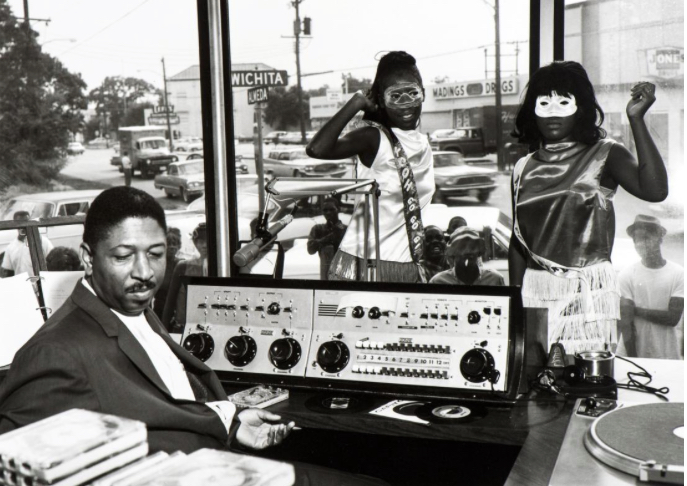
DJ Skipper Lee Frasier by photographer Benny Joseph
Link: Exhibition Info at the ICP site.
(posted 10/19/2015)
Record Store Day: Black Friday
Record store day happens only once a year, around April 15th, but there's also a special edition on Black Friday.

Click the image to open a PDF of all of the Black Friday special Record Store Day offers.
Go to the Record Store Day site for a list of record stores in your area who are participating.
And if you're interested in some great gently-used vinyl: LP Vinyl Music is our sister site where you can buy great vinyl, including unique and rare radio documentaries and interviews, as well as some DVD and Blu-ray titles.
Dennis Elsas' "Rock 'N' Roll Never Forgets"

Dennis Elsas is bringing his live multi-media show "Rock 'N' Roll Never Forgets" to the RCC Cultural Arts Theatre in Suffern, NY this Saturday, October 3rd at 8pm. Along with highlights from his history-making interviews with John Lennon, Elton John, Jerry Garcia and others, he will revisit the sights and sounds of the NY Top 40 stations he grew up with, the progressive evolution of FM Rock and his years on-air with WNEW-FM and currently WFUV and Sirius/XM. More info and a video at Dennis Elsas.com (Posted 9/28/15)
"I Am What I Play" now available on Vimeo
"I Am What I Play" is a new documentary that profiles four DJs in major markets who were active during the 1960s to 1980s. It features Meg Griffin as well as Toronto-based David Marsden; WBCN, Boston morning man Chalres Laquidara; and Seattle DJ and PD Pat O'Day.
The film includes rarely seen archival footage of the DJs, the radio stations and the performers. We'll post screening dates as we know them. More info at the movie site here. (Posted 8/21/15)
Upcoming Screenings
An Evening with Charles Laquidara!
Wednesday, December 23, 2015 - 7:30pm (doors 6:30)
The Regent Theatre - 7 Medford Street - Arlington, MA
Charles Laquidara will appear in-person talking about his three decades on the air at WBCN and WZLX.
$15 advance, $18 day of (includes BBQ appetizers
Web InfoRadioLoveFest at BAM May 5-10
RadioLoveFest returns for a 2nd year to the Brooklyn Academy of Music May 5th to 10th.
This year's festival includes live broadcasts of Radiolab; Terry Gross being interviewed by Marc Maron; "Don't Look Back" with Molly Ringwald; a WQXR trivia night; "Wait Wait. . .Don't Tell Me!"; Hillary Frank; Razia Iqbal and a panel in a discussion about Islamopobia; "Snap Judgement" live; "Death, Sex & Money; BAMcafé; Bullseye Comedy Night; Selected Shorts; a WQXR Beethoven Piano Sonata Marathon; John Schaefer with an evening of music by Morrisey; a celebration Richard Rodgers with Jonathan Schwartz; and Leonard Lopate discussing food and Brooklyn as a brand.
RadioLove Fest info online
April 7, 2015: Stan Freberg dies at 88
The great Stan Freberg, who's generally given credit for creating the funny commercial and who was a great satirist as well as a voice actor in his own right, died today at 88.
Freberg started his career as a voice actor in 1944 for Warner Brothers cartoons, where he was frequently paired with Mel Blanc (but only Blanc got on-screen credit.) He also did work for Disney. In 1951, he appeared on-screen in the comedy "Callaway Went Thataway" and he also appeared in 1963's "It's A Mad, Mad, Mad, Mad World."
He started creating satirical recordings in 1951, beginning with "John and Marsha", which contained only those two names repeated over and over with different emotions, a routine not dissimilar to a later one created by Nichols & May. He also produced a Dragnet parody with cartoon voice actors Daws Bulter and June Foray. Other recordings satirized Elvis Presley, the Platters and Harry Belafonte.
Freberg's 1954 radio show, "That's Rich", satirized the Cold War and McCarthyism and his 1957 "Stan Freberg Show" was a replacement for Jack Benny's radio show. Freberg refused to permit cigarette advertising on his show long before the Surgeon General's report.
Freberg was instrumental (along with Bob & Ray) in adding humor and satire to advertising and he produced commercials for Great American Soups, Sunsweet, Jeno's Pizza, Butternut Coffee and many other advertisers.
Freberg also made many TV appearances on such shows as "The Ed Sullivan Show", "The Girl From Uncle", "The Monkees", "Roseanne" and the short-lived "Weird Al Show".
Freberg was inducted into the National Radio Hall of Fame in 1995. One of his most famous radio creations was a spot intended to encourage advertisers to buy radio time. It demonstrated how radio could make one believe that you could create an ice-cream sundae the size of a mountain. That spot still sounds brilliant today and is included in the below YouTube video.
The jingle in the above spots features Sarah Vaughn on vocals and a Quincy Jones arrangement.
March 28, 2015: Vin Scelsa announces his retirement
Vin Scelsa first appeared on the radio in 1967 at the Upsala College radio station, WFMU. Over the last 48 years(!), he has also appeared on WBAI, WABC-FM, WNEW-FM, WXRK and WFUV as well as Sirius and Sirius/XM satellite radio. Vin is probably the only DJ in New York commercial radio to have maintained his independence and freedom over his entire career.
Many artists owe at least part of their success to Vin's willingness to bring unique and independent sounds to the attention of his listeners.
Vin appeared on WABC-FM in 1971, initally holding down the 5:15-7:15pm shift. By September of 1974, he was doing weekends on WNEW-FM. In 1988 and 1989, he shifted to WXRK, but returned to WNEW-FM after where he continued his weekend show until WNEW-FM changed to a Hot Talk format in the fall of 1999.
His last edition of "Idiot's Delight" will be broadcast on 90.7 WFUV on Saturday, May 2nd.
March 29, 2015: Pat St. John to leave WCBS-FM
Pat St. John, who's been on New York radio since the 1970s, has announced that he's leaving CBS-FM, where he's been holding down the Sunday 11-3pm airshift, in order to spend more time with his west-coast based family.
Originally from Detroit, Pat joined WPLJ in 1973, held a regular shift from 1974 and stayed until about 1987. From 1988 to 1993, he did 10am-2pm at WNEW-FM after Dave Herman moved to drive-time and he held other shifts on the station through 1998. He also spent time as Program Director. He has also frequently appeared on CBS-FM from at least 2003 and is heard on several different shows on Sirius/XM. His Sirius/XM shows will continue.
Pat is still a big fan of rock and roll and has terrific insights into the artists and music. He's known for being informative on the air and for playing that rare but great track that you didn't know existed.
Pat St.John
Paul Leslie Interviews
Since Les Paul is the patriarch of everything, when a guy named Paul Leslie contacts us, we perk up. Mr. Leslie has a very interesting website filled with interviews of people involved in music, media and radio.
Of particular interest to us are the interviews with WBAI's Bob Fass and with Joe Franklin, who has been active in radio since 1951:
Bob Fass Interview
Joe Franklin Interview
The Bob Fass interview is particularly interesting and delves extensively with Fass' upbringing in New York City, his experiences at WBAI, the music that he loved to listen to and some tidbits about Bob Dylan.
Steve Post Tribute
There will be a public tribute on Steve's Birthday, March 20, 2015 at 6pm at Symphony Space's Sharp Theater: 2537 Broadway, at 95th St.- video, audio, speakers.
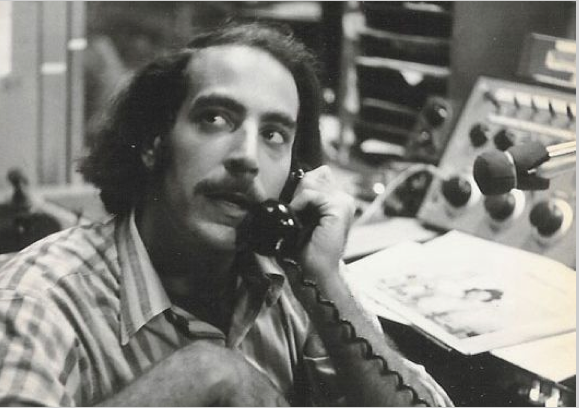
Steve Post was a freeform radio pioneer in the late 1960s and early 1970s at WABI. Bob Fass, drawing inspiration from Jean Shepherd, initially transformed and redefined the form and Fass, Post, and Larry Josephson then embraced the idea and pushed it to new extremes.
Post didn't care about fairness, objectivity or balance -- he just said whatever the hell came into his mind. But he formed deep connections with his listeners.
Post was certainly curmudgeonly. If Will Rogers had famously said that he never met a man he didn't like, Post said no such thing - indeed, he quoted Hobbes as an influence, saying "I believe people are essentially brutal, murderous, lying bastards who put on masks of civility to make society work."
Post was brilliant at on-air fundraising and raised millions of dollars.
In the course of his on-air career, Post was host/producer of "The Outside" and "Room 101" on WBAI and "Morning Music" and "The No Show" on WNYC.
Post died this past August 3rd, age 70. He influenced almost every FM freeform jock of the late 60's and 70's - even those who had never listened to him, but were influenced by those who did.
(The above is paraphrased from the WBAI website posting).
WBAI and WNYC-FM Personality Steve Post Dies at Age 70
Steve Post, who was one of the first practitioners of what would later be called free-form radio, died Sunday, August 3rd, at the age of 70.
In the late 1960's and early '70s, Post hosted "The Outside" on WBAI after midnight on weekends (Bob Fass hosted weekdays). pst would play music of all genres - music that would not be heard on commercial radio - woven with stories and complaints about living a modern life.
From 1973 to 1980, he hosted the WBAI morning show, "Room 101".
From 1982 to 2001, he hosted the "Morning Music" show on WNYC-FM. He returned to WNYC in 2002 to host "The No Show".
One of our favorite oft-repeated Post stories was the time he got locked in the bathroom at WBAI and had to climb out the window to get back to the studio so that there would be no dead air.
Post was also the author of "Playing in the FM Band: A Personal Account of Free Radio" (Viking Press, 1974).
Post broke every rule of conventional radio and was a great contrarian. So there was never any chance that he was going to work in commercial radio. But both Post and Fass had great influence on the early FM commercial free-form DJs. (Posted 8/4/14)
Dave Herman Dies
Dave Herman, one of the greatest air personalities of the free-form and progressive rock eras, has died at the age of 78. WABC Channel 7 news reported Herman's death apparently from "suffering an aneurysm of a major blood vessel near the heart".
Dave had worked at WMMR-FM in Philadelphia, a sister station to WNEW-FM, before coming to New York and joining the new air staff at WABC-FM around May of 1970. The staff also included Tony Pigg, Jimmy Rabbit, Jimmy Fink and John Rydgren late at night. Dave initially had a morning and an evening show on the station. In February of 1971 the station changed its call letters because it was afraid that WABC-AM was getting credit for its ratings in surveys. Legend has it that Herman came up with the WPLJ call letters, based on the old song, "White Port Lemon Juice". But by August of 1971, the station became highly formatted and Herman was unhappy. He left WPLJ in late 1971 and joined WNEW-FM in March of 1972, taking over the morning show on May 22nd of that year.
In late May of 1982, he took over the nightime slot, which was held by Alison Steele for many years. In 1983, he moved into Pete Fornatale's morning slot and in November of 1986, he returned to the morning show. From about early 1992 to 1996, he moved to K-Rock, where Howard Stern commanded AM drive and Pete Fornatale followed. Herman followed Pete. In January of 1996, K-Rock changed to a "Modern Rock" format and all of the former WNEW-FM jocks left the station. Herman and Fornatale returned to WNEW-FM with a "Classic Rock & Classic Jocks" format, but WNEW-FM never returned to its former glory. Fornatale was let go in the Summer of 1998 and Herman that November.
Herman was involved in many syndicated radio efforts including the "King Biscuit Flower Hour" concert series as well as a series of interviews, the most famous of which was probably his interview with Ringo Starr.
On the air, Dave had a wonderful presence, always sounding both incredibly friendly and incredibly important. He had an incredible knowledge of music and would frequently sneak in an off-format track, like a Louie Armstrong recording.
In late 2013, Herman was accused of soliciting sex with a young child by federal agents who set up a sting operation. We'll now probably never know the truth of those accusations, but there was word last week that the feds were reconsidering charges. Since there was no actual child and Herman never got his day in court, my preference is to remember the decades of joy that he gave everyone on the air. But regardless of the merits of the charges, I have no doubt that Dave actually died of a broken heart. (posted 5/28/2014)
Link: Vin Scelsa announces the death of Dave Herman.
Great new record store: Rough Trade
Rough Trade is a branch of a British record store that opened in Williamsburg, Brooklyn on November 25th, 2013. It's located at 64 N. 9th Street and sells both new LPs and vinyl and will also have a large performance space to be booked by Bowery Presents, once they add some more soundproofing. The store is an amazing 15,000 square feet. I've noticed a lot of criticism online that they're not planning on selling used vinyl - it will be interesting to see if that changes over time.
Stan Brooks interview
CUNY TV will rebroadcast Michael Stoler's half-hour interview with legendary WINS Radio reporter Stan Brooks, who passed away on December 23rd (2013), as part of the "BuildingNY-New York Stories" series, on Thursday, January 2nd (2014) at 11:30pm.
The interview was recorded on April 10, 2012, and looks back on Brooks' remarkable career and highlights. It is also archived for viewing anytime on CUNY TV's website, www.cuny.tv
CUNY TV is broadcast over the air in the New York metropolitan area on digital Ch. 25.3, and is cablecast in the five boroughs of New York City on Ch. 75 (Time Warner and Cablevision/Optimum Brooklyn), Ch. 77 (RCN Cable) and Ch. 30 (Verizon FiOS).
It's been 33 years
Thirty-three years ago tonight we got the devastating news that John Lennon was shot to death. His death was a loss for the entire world. But it was a night in which some radio stations demonstrated just how powerful radio could be in bringing a community together. I doubt highly whether there are many stations in a position to accomplish the same today.
As each year passes, I fear that younger people no longer realize the greatness of the Beatles in both their group and solo configurations and the genius of Lennon in particular, especially since most were born after Lennon left us. I still miss his presence, but I also wonder whether he'd still be a powerful creative force in music and in his devotion to world peace. Lennon would have been 73 this year. (Posted 12/8/2013)
Dave Herman (revised)
Obviously, the news reports about Dave Herman's alleged behavior are devastating, if true. While the evidence seems overwhelming, we'd like to withhold judgement until all the facts are in, but the response which was released today (October 31, 2013), which is "the woman said she'd only meet me if I SPOKE to her about her daughter in this way" seems bogus and ridiculous. Why would anyone want to meet a woman who would only meet up if you talked about her young daughter having sex with an adult?
Luckily, there was no real mother or child involved, so no one got hurt (except for Herman's legacy). While I still can't believe that Dave Herman would behave in this way, it's sure looking bad In some ways, I'm glad that most of the legendary WNEW-FM jocks aren't around to have seen this.
The Left Coast
From RadioInfo.com: Bonneville classic rock KSWD, Los Angeles '100.3 The Sound' is presenting a "Mighty Met Weekend" beginning tomorrow (11/1/2013) and running through the weekend. DJs from historic Los Angeles rock outlet KMET-FM will grace the station's airwaves starting at 3:00 pm PT.
Personalities include: Dr. Demento, Jeff Gonzer, Ace Young, Jack Snyder, Paraquat Kelley, Rick Lewis, Rick Scarry, Billy Juggs, Dr. Leon, Frazer Smith, David Perry and Jim Ladd. Bonneville says in a statement, "KMET was the flagship station for FM rock radio and 'ground zero' for the cultural revolution of the 1970s. 'The Might Met' hit the air in 1968, and for much of its run was the #1-rated radio station in Los Angeles, thriving from innovative music and quirky personalities with a take-no-prisoners attitude. The station's 'A little bit of heaven 94-point-7 KMET-Twiddle Dee' jingle will forever remain stuck in the ears of Southern California's baby boomers."
Happy Birthday Pete Fornatale
August 23rd, 2013 would have been Pete Fornatale's 68th birthday. While not always credited, Pete was among the first air personalities to play rock and electric folk music on FM radio in New York on a regular basis (along with Bob Fass and Steve Post on WBAI). That doesn't sound like a big deal now, but in 1964, rock on FM was akin to walking down the street naked smoking dope.
In April of 1964, just over 49 years ago and just three months after the Beatles invaded America, he hosted the "Friday Musicale", which quickly became the "New Friday Musicale" and then "Friday in New York". In September of 1964, he hosted a show called "Swing Easy" and in November of that same year, he recorded a pilot for a Saturday morning show to be called "Campus Caravan". The first "Campus Caravan" was broadcast on November 21, 1964.
He premiered at WNEW-FM on the eve of the Woodstock Festival in 1969 (44 years ago last week). Pete held down various shifts on WNEW-FM over the years until about 1988 when he moved to WXRK where he stayed until January of 1996 when WNEW-FM moved to a "Classic Rock and Classic Jocks" format and he returned. That lasted until late summer of 1998, when WNEW-FM moved to a hot-talk format. Pete returned to WFUV in 2001, where he presented his "Mixed Bag" show every Saturday until his untimely death in April of 2012.
Pete was also a prolific writer, having written a number of books on media and rock & roll, the most recent being about the Rolling Stones ("50 Licks: Myths and Stories from Half a Century of the Rolling Stones") which was completed by his son Peter; the Woodstock Festival ("Back to the Garden: The Story of Woodstock"); and Simon & Garfunkle ("Simon and Garfunkel's 'Bookends'").
But most of all, Pete was a great person who donated much of his time to charities, such as "Why Hunger?" and he was a good friend to many. He's missed by everyone that grew up listening to him on the radio.
RADIO UNNAMEABLE Bob Fass Documentary
Unless you're Ken Burns, it's almost impossible today for serious independent filmmakers to get documentaries completed because it's so hard to obtain funding. There are a number of documentary projects of interest to us that have been underway for years, with no signs of completion. Unfortunately in the United States, most have to be abandoned.
But I'm very happy to announce that a documentary we told you about last year, RADIO UNNAMEABLE, about Bob Fass of WBAI, has been completed and just finished a run at the Film Forum in NYC.
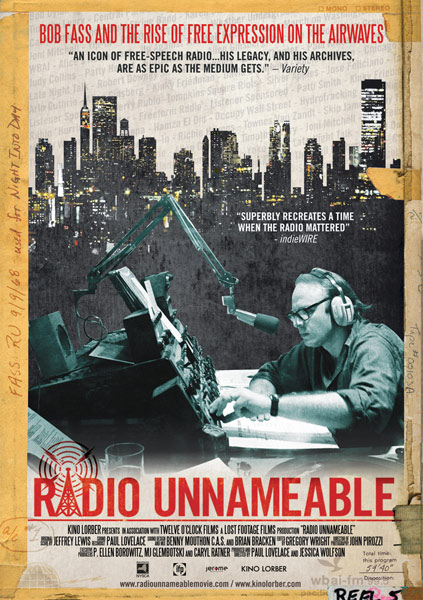
Directed by Paul Lovelace and Jessica Wolfsohn, RADIO UNNAMEABLE is a documentary film about legendary radio personality Bob Fass, who revolutionized the FM dial on listener supported New York station WBAI by serving as a cultural hub for music, politics and audience participation for nearly 50 years. Long before today's innovations in social media, Fass utilized the airwaves for mobilization, encouraging luminaries as well as ordinary listeners to talk openly and without commercial considerations, taking the program in surprising directions. RADIO UNNAMEABLE is a visual and aural collage that pulls from Bob Fass's immense archive of audio, film, photographs and video that has been sitting dormant until now.
RADIO UNNAMEABLE played for two weeks at New York's Film Forum and many other venues around the country.
Click here
for more information about the movie.Click here
for the New York Times review of the movie.Click here
for a New York Times article about Bob Fass' archive which includes several short air-checks.The Review
When Paul and Jessica contacted us over a year ago to see if we had any WBAI material, I had my doubts about the success of such an effort. After all, there aren't that many people interested in radio these days. Take those people and filter them down to those that care about New York radio. Then take those people and find the ones who still care about 1960s-70s radio. (Well...OK, those are the people who visit this site.) Now take those remaining and find the ones who care about Bob Fass and WBAI. I thought that number would be about nine (me being two of them).
Then I thought that even if there was such interest, how much archival material, especially visual material, could possibly be available? After all, the peak of Fass' radio career took place in the 1960s and 70s, before the age of portable video.
I couldn't have been more wrong. This film has been selling out at the Film Forum. It is filled with wonderful visuals and audio. As it turns out, Fass saved about 7000 reels of tape from his shows. (Not the least bit organized or cataloged, but at least they were kept).
This film is about far more than one late-night radio personality. It's about a city, political and social movements, the best use of radio to get something positive accomplished, and how Fass (and a few others like him) created a comfortable environment for new artists to explore their art and present it to the public before the age of complete and crass commercialism. But it's also about how internal politics and the segmentation of political movements came together to destroy even the most utopian environments and the resulting fallout.
While no commercial radio station was ever as free-form as Fass (and Steve Post) was on WBAI, it's easy to see the influence he had, especially on personalities like Vin Scelsa, who appears in the film. Also appearing is Judy Collins, the voice of Joni Mitchell, Paul Krassner, Steve Post, Abbie Hoffman, Marshall Efron, Dave Van Ronk and many other luminaries of the era.
We always knew there was a core of people who listened to WBAI, but I don't think many outsiders today believe it had all that much influence. The reality, as shown in the documentary, is that Fass could get thousands of people to show up for a "Fly-In" at Kennedy Airport or the equivalent of a flash-mob at Grand Central Station (which ended in violence) and many other such events.
One of the surprises of this documentary is that it's so damned entertaining - it's simply a delight to watch. It brings us back to a time of great social movements as well as silliness and excesses. But you walk away from this film thinking, "Radio was really important then, wasn't it?" And it mostly seems so trivial and unimportant now.
Listeners to his show were constantly trying to seek ways to help people. One woman called-in distraught because of an apartment fire. People called in offering her a free hotel room. Fass got listeners (or his "cabal", as he called it) together to clean the streets during a garbage strike. Fass himself kept a guy on the air who claimed to be in the process of committing suicide and saved his life. Can you imagine any radio station, commercial or non-commercial, that could accomplish these things today?
HIGHLY RECOMMENDED! It won't be playing long...don't miss it. And if you don't live in New York, keep looking for it at your favorite art house (or call them up and demand that they program it).
Upcoming Screenings
Radio Unnameable is now available on iTunes, Amazon, Playstation Network, Xbox, Nook and Movies on Demand via your cable provider (Comcast, Cox, Time-Warner Cable and Verizon).
Richie Havens dies at 72
We've just learned that the great Richie Havens has died from a heart attack earlier today (April 22, 2013) at the age of 72. His first major album on Verve Records, "Mixed Bag", released in 1967, was synonymous with the rise of free-form, progressive rock radio and the first track of that album, "High Flying Bird", was the first track played by Rosko when he joined WNEW-FM in October of 1967.
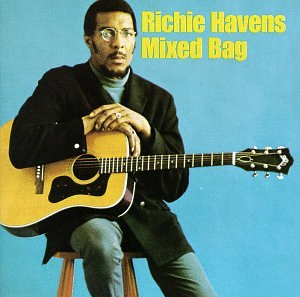
That album also heavily influenced DJ Pete Fornatale who used it as the title of his weekend radio show for many decades. That show is still on the air today, hosted by Don McGee on WFUV.
Havens is also well known for being the very first act to perform at the Woodstock Music Festival in 1969.
WFMU 2012 Radio Festival
On October 20th, 2012, WFMU will present a full day of presentations and panel discussions about radio's future as it takes on new forms in the digital age. Featuring:
- Mark Frauenfelder: Maker culture, Zines, Digital Culture and Podcasts
- Joe Richman: on his Radio Diaries project with kids
- Panel: Radio Free Radio on walking tours, immersive apps and onine sites.
- Tim Pool: on using a smartphone and external battery to live-stream protests and conventions
- Kenyatta Cheese
- Piracy is the New Radio!: with Anna Troberg, Alexa Clay and a special guest
- Maria Popova's Brain Pickings: she spins art, design, science, technology, etc.
- New Voices, New Formats, New Business Models panel with Glynn Washington, Roman Mars, Jesse Thorn and moderator Liz Berg.
The event will take place at the Scholastic Auditorium, 557 Broadway (Prince/Spring), NYC
Here's a link to more information about the event: RadioVision Web Info
Thom Morrera
WNEW-FM air personality Thom Morrera has passed away. Thom mainly did weekends and overnights in the late 70s and early 80s and was always a welcome voice. Thom also played softball with the WNEW-FM all-stars during the same time period. He was also the director of music programming at Madison Square Garden, was the PA announcer for the Rangers from 1986 to 1993, for the Islanders in 1995 and he was the PA announcer at the U.S. Open from 1991 to 2001. He joins Scott Muni, Pete Fornatale, Rosko and Alison Steele at the great radio station in the sky. (posted August 12, 2012)
Hal Jackson dies at 97
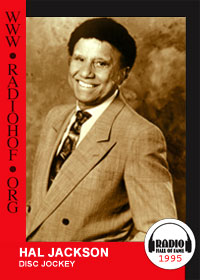
It's another sad day for New York radio. One of the nicest guys in radio, Hal Jackson, passed away on May 23rd, 2012 at the age of 97. Jackson was one of the first African-American sports announcers and in 1939, he became the first minority host at Washington's WINX.
Jackson moved to New York City in 1954 and to this day, we believe he was the only New York City DJ (and maybe the only DJ anywhere) to appear live on three different radio stations in three different timeslots: on WNJR from 4-6pm, WMCA from 8 to 10pm and on WABC midnight to 6am! As they say, "the hardest working man in show business." In 1967, he still had a show on WNJR from 1 to 6pm daily.
Jackson hosted many shows and events from Palisades Amusement Park, where I met him in 1968. You could talk to Hal for just a few minutes and it was as if you had been lifelong friends.
In 1971, Jackson and ex-Manhattan Borough President Percy Sutton co-founded the Inner City Broadcasting Corporation which acquired WLIB and WLIB-FM, which eventually became WBLS.
In addition to his executive duties, Jackson still remained a broadcaster with a Sunday show on WBLS. He is an inductee into the Radio Hall of Fame and the NAB Hall of Fame. He was given a Pioneer Award by the Rhythm and Blues Foundation in 2003 and in 2010 he was named a "Giant in Broadcasting" by the Library of Broadcasting.
I'll admit to not having listened to Jackson on the air in a very long time, but he will definitely be missed.
Pete Fornatale Dies at 66
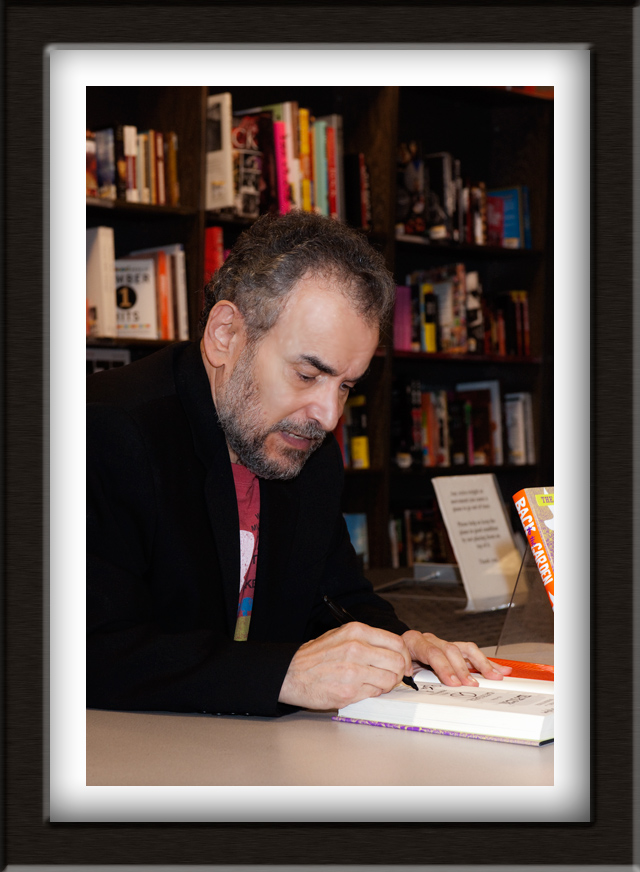
We have the very sad job of letting you know that we've lost our very good friend Pete Fornatale, who died earlier today (Thursday, April 26, 2012). Pete Fornatale had been involved in New York radio for almost 50 years. He began as a student air-personality on WFUV 90.7, the Fordham University Station. In April of 1964, almost exactly 48 years ago, he hosted the "Friday Musicale", which quickly became the "New Friday Musicale" and then "Friday in New York". In September of 1964, he hosted a show called "Swing Easy". In November of that same year, he recorded a pilot for a Saturday morning show to be called "Campus Caravan". The first "Campus Caravan" was broadcast on November 21, 1964.
Pete, along with such WBAI personalities as Bob Fass and Steve Post, created what would later be known as free-form radio. They played rock music, but presented in a style that was suitable for adults. No screaming, no jingles, no crazy sound effects, no echo chambers, no hysteria. And they taught us about the music as they were learning it themselves.
It wasn't necessarily apparent from those early shows that Pete would become a legendary New York DJ. Playing any rock on WFUV at that time was revolutionary, but Pete's taste in those early days was fairly conservative, leaning towards groups like the Beach Boys and the Four Seasons. He also played a lot of middle of the road music such as Frank Sinatra and Sammy Davis, Jr. And at first, he didn't like Bob Dylan much.
In the Fall of 1966, when Scott Muni, Murray the K, Johnny Michaels and Rosko joined WOR-FM, Pete became a big fan, especially of Rosko, and Rosko (Bill Mercer) eventually became Pete's mentor. When progressive rock moved to WNEW-FM beginning in the Fall of 1967, Pete set his sites there and eventually was invited to audition. But he was so nervous that he failed his first audition. Before trying again, he worked at a number of local radio stations and taught media at the college level. He successfully auditioned again for WNEW-FM and he premiered on the station on the eve of the Woodstock Festival in 1969.
By July of 1970, Pete was doing early mornings and when Rosko left in March of 1971 and Jonathan Schwartz took Rosko's spot, Pete moved to the 10am-2pm slot, which he held until about 1982. By this time, Jonathan Schwartz and Alison Steele had left the station. It was becoming much more commercialized and formatted. Pete decided to devote his energies to a show where he could still have creative freedom, so he moved to weekends and created his "Mixed Bag" show, which premiered in December of 1982 and was named for the first album of another one of his heroes, Richie Havens.
From around 1988, he moved to WXRK, where he followed Howard Stern, staying until January of 1996 when WNEW-FM returned to the "Classic Rock & Classic Jocks" format, where he resided until late Summer of 1998, when WNEW-FM started to evolve to a hot talk station.
Pete returned to WFUV in 2001, where he held down a four-hour shift reviving his "Mixed Bag" show on Saturday evenings. The program featured thematic song selections, live studio performances and amazing interviews with such musicians as Brian Wilson, Graham Nash, Tony Bennett, Richie Havens, Cyndi Lauper, Lyle Lovett, Carly Simon and Regina Spektor. Eventually, many of the interviews were spun-off into another syndicated show called "Mixed Bag Radio" which was also heard on XM Radio.
Pete was also a successful author, having written such titles as "Radio In The Television Age", "All You Need Is Love: And 99 Other Life Lessons from Classic Rock Songs", "Back to the Garden: The Story of Woodstock" and "Simon and Garfunkle: Bookends", among others. He created a number of multimedia shows in conjunction with those titles. At the time of his death he had been working on a new book about The Rolling Stones.
Pete Fornatale was also involved with many charitable ventures: he has been associated for decades with WhyHunger, an organization co-founded by Harry Chapin and Bill Ayres. And he could be frequently seen on WNET-TV 13, hosting many rock & roll and folk music shows during fund raising.
In late 2011, Pete was honored as a recipient of the AFTRA Foundation's 2012 AFTRA Media and Entertainment Excellence Awards (The AMEES) (see below).
We will all miss Pete. If you wish to leave a message for Pete's family, you may do so at Pete's website: PeteFornatale.com.
Here's a link to the NY Times Obituary: NY Times website
There are already many airchecks and other ephemera about Pete on this site. But over the next few weeks, to celebrate Pete's life as a broadcaster, we will be posting many more airchecks from throughout his career.
Rock 'N' Roll Never Forgets: Dix Hills Performing Arts Center: Dennis Elsas
WFUV, Sirius and ex-WNEW-FM DJ Dennis Elsas presented his multimedia show about his radio career a few weeks ago at the Dix Hills Performing Arts Center. Click the image for more info.
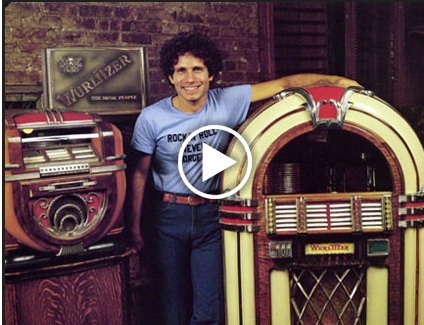
Link
Pete Fornatale Honored with a 2012 AFTRA Foundation AMEE Award
Veteran New York air personality and friend of this site, Pete Fornatale, was honored by AFTRA at a gala benefit held Feb. 6, 2012 along with the actress Phylicia Rashad and singer Rosanne Cash.
Shelby Scott, AFTRA Foundation President and former AFTRA National President said, “Pete, Phylicia and Rosanne have each made significant contributions to their fields and continue to do so with integrity, a commitment to excellence and admiration for their audiences and colleagues. We are thrilled to be able to honor them.”
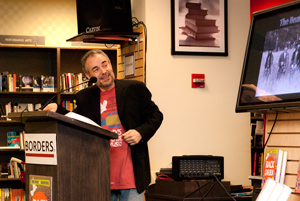
Legendary disc jockey and respected rock historian Pete Fornatale has been a fixture of New York radio for almost half a century. He started his career in 1963 as a Fordham undergraduate hosting “Campus Caravan” on WFUV 90.7, which many cite as the first regularly-scheduled program to play rock music on FM radio in New York. He joined WNEW-FM in 1970 where he stayed until 1988 when he moved the K-ROCK. He re-joined WNEW-FM in 1997 when the station returned to its "classic rock and classic jocks" format, where he continued on the air until the Summer of 1998. He currently hosts his weekly show, “Mixed Bag.” on 90.7 WFUV.
The program features thematic song selections, plus in-depth interviews and live in-studio performances with some of the world's most historically influential musicians including Tony Bennett, Ben Folds, Richie Havens, Cyndi Lauper, Lyle Lovett, Graham Nash, Neil Sedaka, Carly Simon, Regina Spektor and Brian Wilson.
Fornatale is the author of several books focused on media, pop culture and music including “Back to the Garden: The Story of Woodstock,” “Simon & Garfunkel’s Bookends” and “All You Need Is Love: And 99 Other Life Lessons from Classic Rock Songs.”
Fornatale co-hosted the 1991 HBO telecast of “Paul Simon Live in Central Park, ” and has regularly served as an expert guest commentator on PBS specials featuring legendary performers such as Bob Dylan; John Fogerty; The Grateful Dead; Jimi Hendrix; Roy Orbison; Peter, Paul and Mary; James Taylor and others.
His work has been recognized with numerous awards, including the coveted Armstrong Award for Excellence in Musical Programming. He is a board member of WhyHunger and an honorary board member of the Long Island Music Hall of Fame.
Fornatale grew up in the Bronx and graduated from Fordham University. He currently resides on the beach in Rockaway and is the proud father of three grown sons.
We congratulate Pete on this great honor.
While we're talking about Pete, he frequently gives multi-media presentations based on his books. Perhaps some of you caught his show about Woodstock. More recently, he created a new presentation around his book about the making of Simon & Garfunkle's classic “Bookends”. That was followed by a Richie Furay concert and of course Pete introduced that show. Pics here: Richie Furay show
Update: On December 4, Pete gave this presentation again at the Irvington Town Hall Theatre. Only this time, someone very special showed up as well: Art Garfunkel. Story and pics here: Pete Fornatale with Art Garfunkel
WNEW-FM's 44th Anniversary
We celebrated the 44th anniversary of WNEW-FM on October 30th, 2011. So we posted tons of newly found airchecks of WNEW-FM, especially from their anniversary shows, largely thanks to contributor Ken Tullipano. Click here
Richard Koziol
Long time New York radio engineer Richard Koziol passed away suddenly on October 15th. Richard worked at many New York radio stations and production houses including Cinema Sound Ltd, WNCN, WRFM, WAXQ, WKCR and WNYW.
He was recognized by many as not only an engineering genius, but an all-around nice guy. Condolences to his brother Jim (another engineer) and the entire Koziol family.
Norman Corwin 1910-2011
Golden age radio genius Norman Corwin has passed away on October 18, 2011 at the age of 101.
While Mr. Corwin had nothing directly to do with free-form and progressive rock radio of the 1960s and 1970s, you can hear his influences in much special programming of that era.
He was best known for working at CBS Radio in the 1930s and 1940s and was responsible for “We Hold These Truths,” which was produced for the 150th anniversary of the Bill of Rights and broadcast just eight days after the Pearl Harbor attacks.
Upon the German surrender in World War II, he presented “On a Note of Triumph” to celebrate the victory. It featured a score by Bernard Herrmann, who later produced soundtracks for Alfred Hitchcock and Martin Scorsese.
He was “graylisted” during the McCarthy era and he no longer worked regularly in radio after 1955. He later wrote a number of screenplays, including “Lust for Life,” featuring Krik Douglas as Vincent van Gogh.
Halloween Special: Zacherley!!
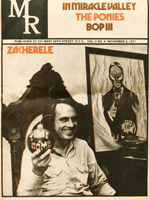
Here's an aircheck for Halloween of the great John Zacherley sitting in at CBS-FM.
Solomon Burke dead at 70
1960s Atlantic recording artist and Rock and Roll Hall of Famer Solomon Burke died on October 10th, 2010 in the Netherlands.
Burke first hit the charts with "Cry to Me" and he wrote and performed the rock and roll standard, "Everybody Needs Somebody To Love". He recorded for Atlantic Records from 1962 to 1968, but also recorded for Bell, MGM, ABC, Chess, Savoy, Rounder, Shout! Factory and other labels since.
In the early part of his career, Burke was known for frying up pork chops backstage and selling them to the band and crew. He began life as a preacher and he also had a mortuary business in Los Angeles. He has 21 children and 90 grandchildren.
Burke was a giant of a man, both literally and figuratively. In recent years, he performed mostly sitting on a throne. He never achieved the fame of label mates Otis Redding or Wilson Pickett, but his unique combination of soul, R&B and blues makes his work part of the rock & roll canon.
Scott Muni Tribute
Scott Muni passed away six years ago on September 28th, 2004.
And Matt Craig of Big Apple Airchecks has produced a Scott Muni tribute, which can be downloaded here (scroll down about half way): Scott Muni Tribute
John Kluge dies at 95
John Kluge, who created Metromedia (parent of WNEW-FM in its prime), has died.
I met Kluge only once and very briefly about a business that had nothing to do with radio.
And here's the New York Times obit: NY Times
(posted 9/9/2010)
And...
*Long-time New York DJ Pete Fornatale is also a writer of numerous books on media, music and radio. His latest is "Back to the Garden: The Story of Woodstock and How It Changed A Generation", which has done so well, it has just been released in a new paperback edition.
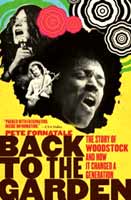
What I like about this book is that Pete sought several sources for each "fact" mentioned to confirm its accuracy. Disclaimer: I'm briefly quoted a few times in the book.
*Posting a mention of the paperback release of Pete's book has given me an idea for a new section for this site: we're going to create a new page that details great books about radio and music. Look for it..umm..sometime. (Posted 5/17/2010)
Great radio wasn't destroyed only in the U.S....
I was in London a few months ago (one of the reasons why there weren't any site updates that week) and I happened to catch a TV documentary about "Channel 2", their pop-music radio station. Although a bit more like a U.S. top-40 station than a prog rock station, they faced many of the same issues as progressive rock stations here: initial freedom, followed by censorship, firings, DJ ego problems, centralized control, etc. But it was fun to watch. It was like being in a parallel universe. One thing I noticed was that the station used jingles that sounded exactly like PAMS jingles. (Posted 5/17/2010)
Fornatale article at the Huffington Post
Check out this article about WFUV (and former WNEW-FM and K-Rock) DJ Pete Fornatale.
Fornatale Article
Breaking News April 1, 2010
Because of frustration with the current economics of radio, the relationship with the record industry, the demands of air personalities to make more than the minimum wage and because as one industry veteran put it, "Everytime I see an iPod, I'd like to rip it off their evil little necks and smash it to the ground," all commercial music radio stations in New York simply ceased broadcasting as of today. Nobody noticed.
Zacherley Today!
Here's a recent article about John Zacherley, who is 91 and appeared at the Chiller Theatre convention in New Jersey April 16-18,2010, as he's done twice a year for many years. Thanks to Bernard Ente for the link.
Cool Stuff: The still cool ghoul
Chiller Theatre Convention
Bernard also let me know that Zach recently attended his 70th (!!!) college reunion. My bet is that he still looked better than everyone else in the room. (Revised post 5/18/2010)

